





editors: j flower-ellis
g hardman
g neave
a bolland
n byrne
n havely




polyhymniae

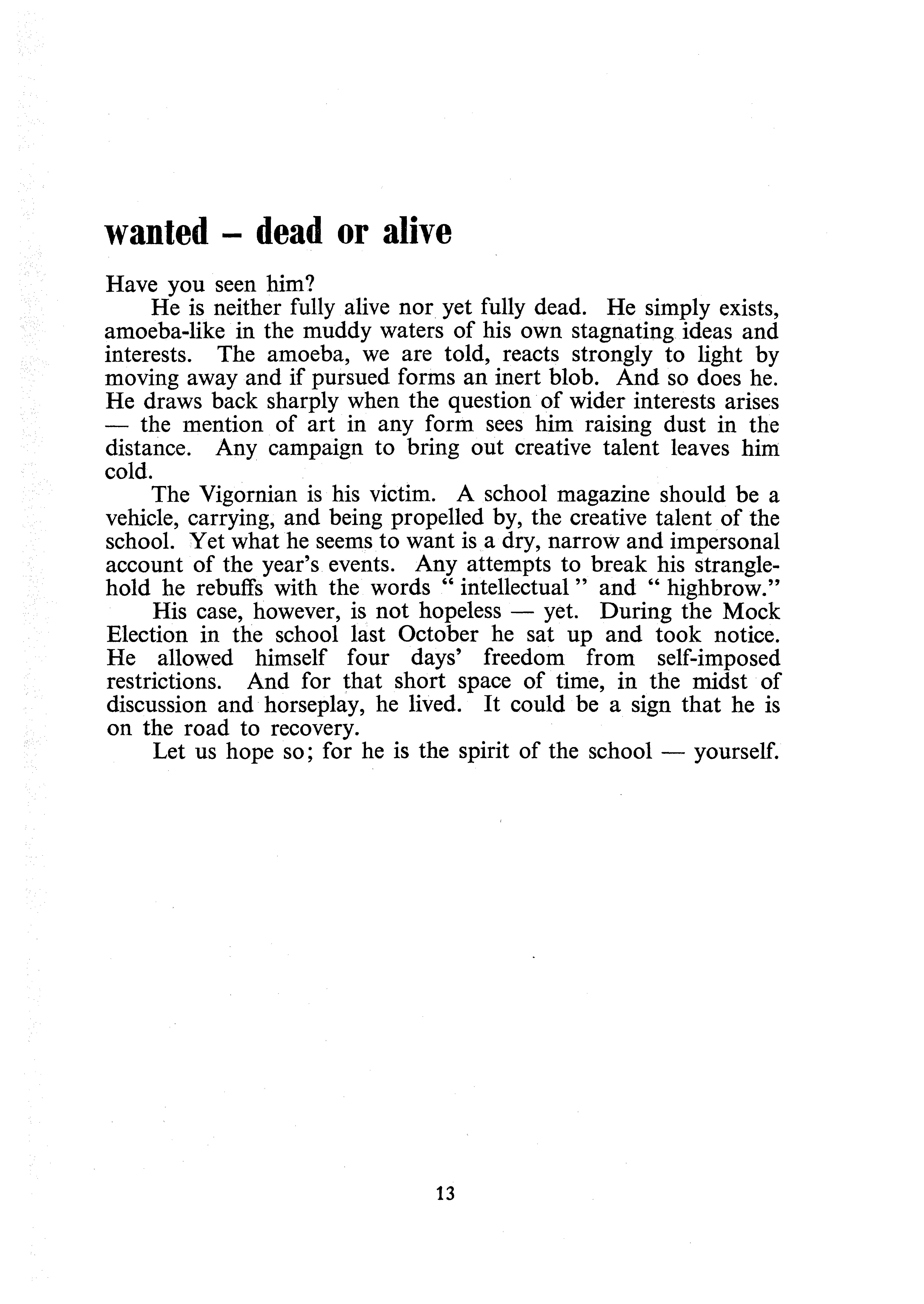
Have you seen him?
He is neither fully alive nor. yet fully dead. He simply exists, amoeba-like in the muddy waters of his own stagnating. ideas and interests. The amoeba, we are told, reacts strongly to light by moving away and if pursued forms an inert blob. And so does he. He draws back sharply when the question' of wider interests arises - the mention of art· in any form sees him raising dust in th"e distance. Any campaign to bring out creative talent leaves him cold. '
The Vigomian is his victim. A school magazine should be a vehicle, carrying, and being propelled by, the creative talent of the school. Yet what he seems to want isca dry, narrow and impersonal account of the year's. events. Any attempts to break his stranglehold he rebuffs with the words "intellectual" and "highbrow."
His case, however, is not hopeless - yet. During the Mock Election in the school last October he sat up and took notice. He allowed himself four days' freedom from self-imposed restrictions. And for that short space of time, in the midst" of discussion and, horseplay, he lived. It could be a sign that he is on the road to recovery.
Let us hope so; for he is the spirit of the school - yourself.
It is with deep regret that we record the death of J. G. K. F**w*r*ll*s, the well known chemist and literary writer, who was overcome by pH 3 on Monday, October 19th, while engaged on vital chemical research. On contacting the Worcester Royal Infirmary the unfortunate gentleman learnt that there was no known antidote. During his stay at the school J. G. K. combined a brilliant academic, military and athletic career. On the academic side he was noted for his ideas on Chemical Theory and his prowess at Mathematics was legendary. He was capable of expressing his feelings in many languages and was often heard to remark " ************! "
One .of the outstanding military brains of his generation, he rapidly rose to the rank of Quartermaster-Sergeant in which capacity he was responsible for his renowned fitting of uniforms and extraction of pull-throughs from rifle barrels. His stout, athletic figure was always prominent on the Rugger Field and he is generally held responsible for the increase in the school's Rugger fortunes. '.
The details of his personal life were clothed in mystery. He is believed to have come from Y**ks**re, although this is not certain as he became incoherent when questioned on the subject, as. he did when asked about his relationship with Radio Prague. He was always good-natured, ready to help and will be greatly missed. The funeral took place in the armoury where the post-cert A platoon fired a round of blank, (flanellette and oil issued immediately afterwards); there were no flowers by request but gin was sent to the Choir House study where the .occasion was duly celebrated.
The next to go if he reads this will be' M. -We Trace and J. R. Tringham.

He stepped gingerly from one plank to another. The scaffolding seemed to sway slightly beneath his tread. Now, get my chisel, yes, that's right. Brr! Hate bending down, feel so unsafe. But, God, that's what you're here for, isn't it? Mmm, where's that mallet gone? Ah, there it is. (Chip, chip, chip). After all, if the job hadn't been so dangerous someone else would have volunteered. But working on an overhead piece of statuary on two planks three hundred feet above the ground isn't exactly pleasant. Look, now you're avoiding the issue. - Ah, that's rather flaky. Yes, it's come right off. Whole stone must be
corroded. - Not looking forward to climbing outwards for half a dozen feet, but then, that'·s the opportunity you're looking for. But why now? After all, you've got a job now. Maybe, but you know damn well that, when they find out that you've never even tried to work stone before, you'll be out on your neck, and they'll employ proper steeplejack firm. But, perhaps, they won't find out. Of course they will, so why put it off when you've got the· chance? Start climbing now. So easy just to slip, and .there's an end of yqur worries. No, don't go through them again. Divorce suit pending. Overdraft. Everything in the house on the nevernever. And a month's· notice before you'd taken up this job ... Hell! Where's that cement? Ah, there. But can I bring myself to ...
He .bent, picked up the bucket, slipped, staggered, and the whole world twisted round and round. His platform seemed unutterably small. The pavement rushed up to meet him ... For the jury it was an easy verdict, without complications: suicide whilst the balance of mind was disturbed.
"Pepper Prices Zoom," notes the Express, "Chinese Syndicate Corners Market." I see, in this, the hand of the notorious and shifty Hei' Yu (a condensed version of a shortened English translation of the name reads:- " Little Mentally Deficient Grain of Polished Rice, Terror of Aged Grandmothers and Purveyor of Bouncing Cheques "), the one-eyed Chinese pepper magnate. By limiting the supplies of this vital commodity he now stands in a position to blackmail the great and noble British Consumer.
Britain, gentlemen, is faced with a Cruet Crisis. She may send -I repeat, may send ... a GUNBOAT up the Yangtse. Or, alternatively, she may have recourse to arms (as in the great and glorious Opium War with China 1839-40) in defence of her indisputable RIGHTS. Whichever way it is viewed, the situation is of the utmost gravity, it concerns us all and is quite definitely not to be sneezed at.

"U.S.S.R. Wants Cultural Relations Extended," reads the heading to a Times article. It appears that Mr. G. Zhukov, the Russian cultural delegate, was questioned during a Press meeting on the subject of the British books banned from the Moscow Exhibition. At this juncture, we are told, he "rose, appearing
uot to have heard the question, shook han'ds, and, smiling affably, departed." So now we know'.
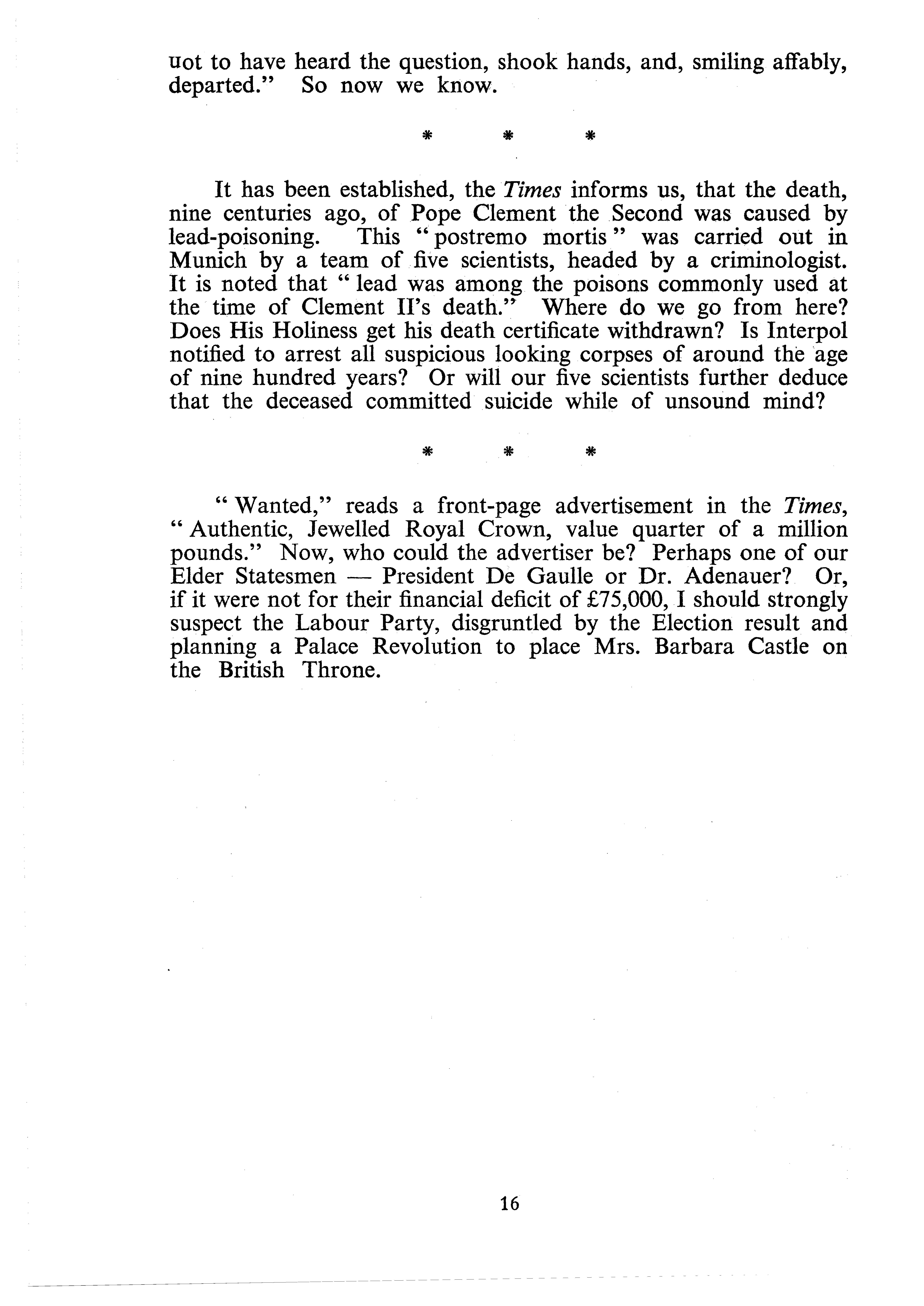
It has been established, the Times informs us, that the death, nine centuries ago, of ,Pope Clement 'the .Second was caused by lead-poisoning. This" postremo mortis" was carried out in Munich by a team of 'five scientists, headed bya criminologist. It is noted that "lead was among the poisons commonly used at the time of Clement II's Where do we go from here? Does His Holiness get his death certificate withdrawn? Is Interpol notified to arrest all suspicious looking corpses of around the "age of nine hundred years? Or will our five scientists further deduce that the deceased committed suicide while of unsound mind?
"Wanted," reads a front-page advertisement in the Times, "Authentic, Jewelled Royal Crown, value quarter of a million pounds." Now, who could the advertiser be? Perhaps one of our Elder Statesmen - President De Gaulle or Dr. Adenauer? Or, if it were not for their financial deficit of £75,000,1 should strongly suspect the Labour Party, disgruntled by the Election result and planning a Palace Revolution to place Mrs. Barbara Castle on the British Throne.

A circle, a line, a blur this figure shows a character of abstractness.
Is it beautiful? Far less than those understandable. Does it mean anything? To me it is void and dull. Is it plaintive? Is it festive? No, it is dead to feeling It never was alive.
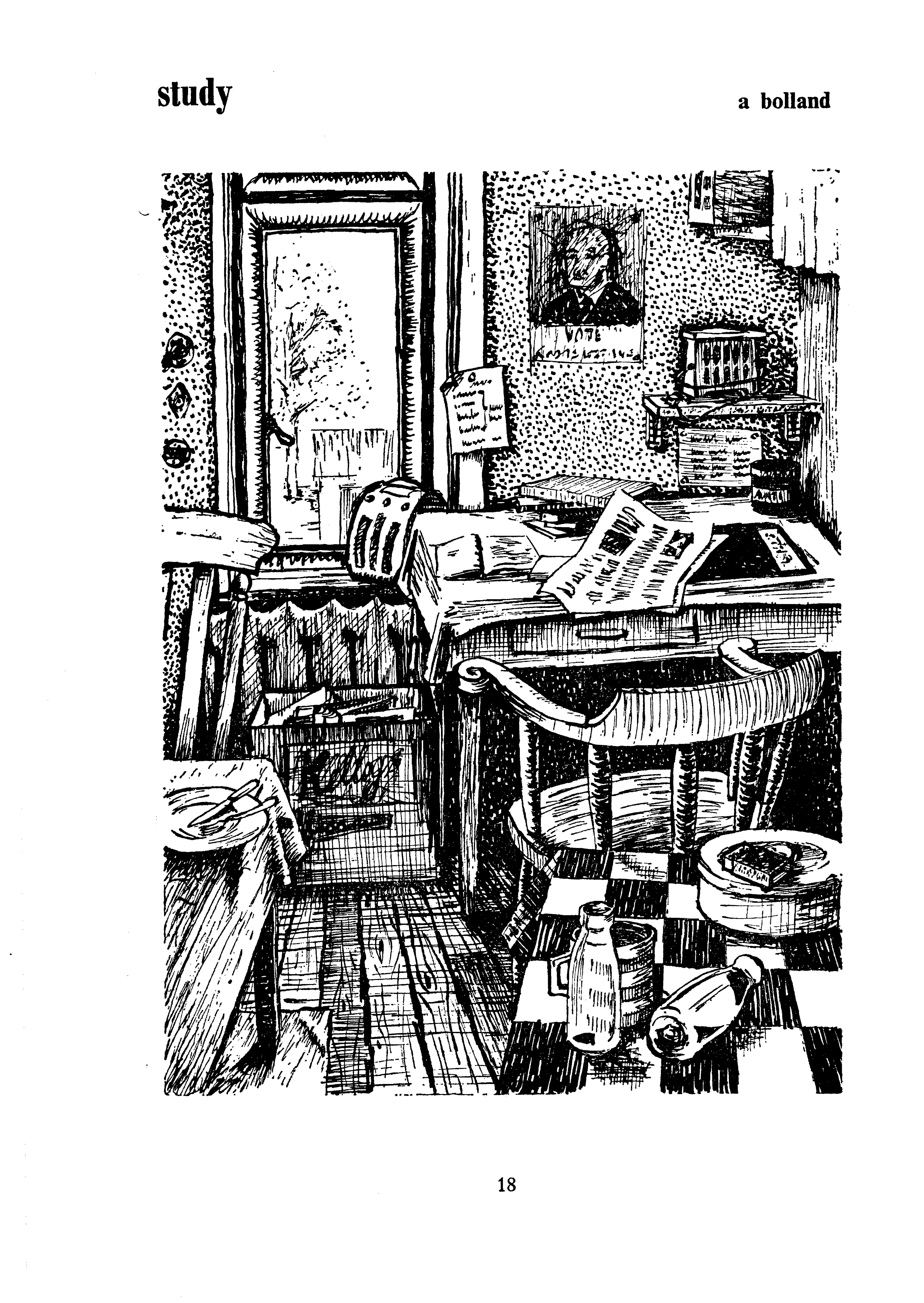
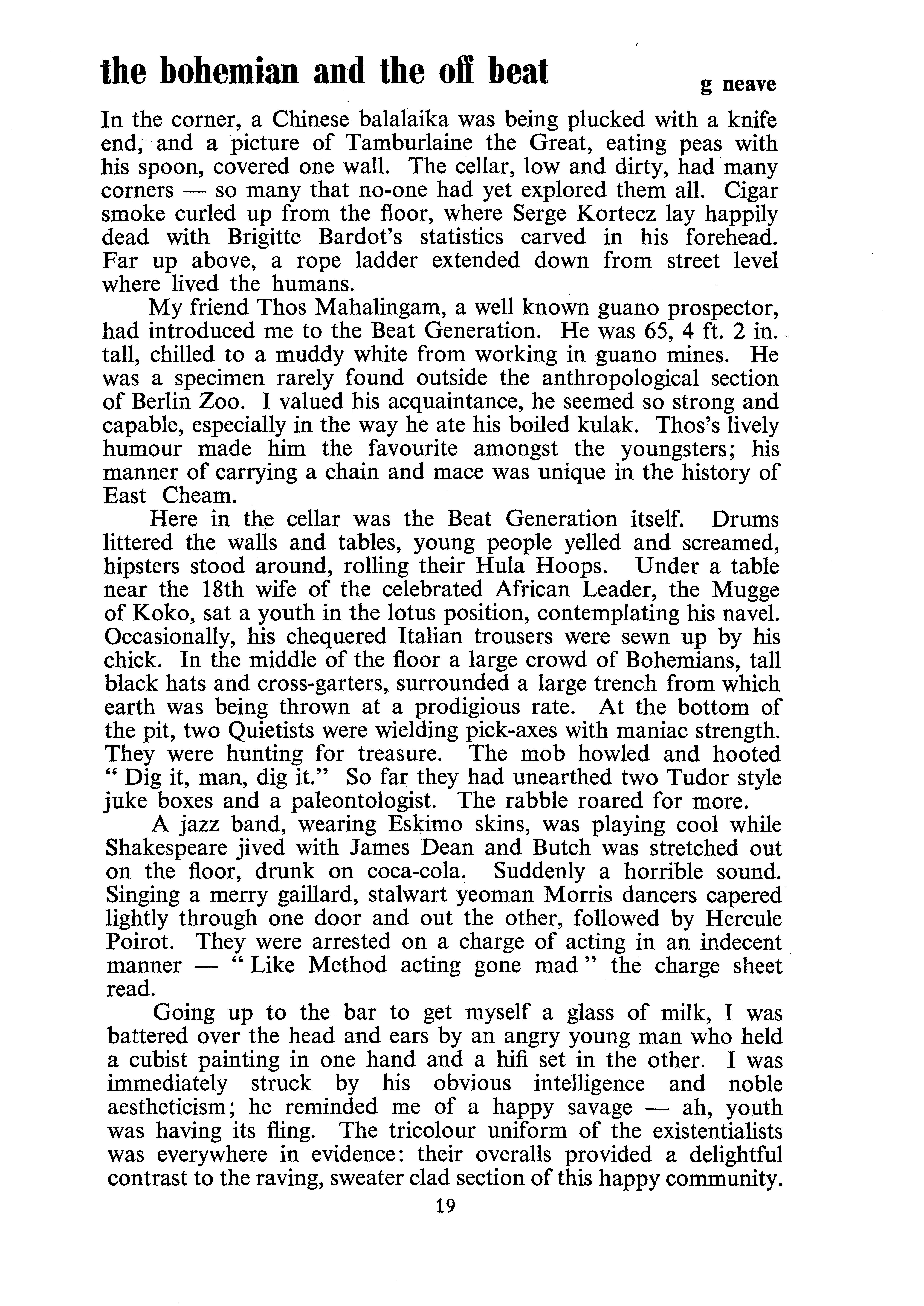
g neave
In the corner, a Chinese balalaika was being plucked with a knife end, and a picture of Tamburlaine the Great, eating peas with his spoon, covered one wall. The cellar, low and dirty, had 'many corners - so many that no-one had yet explored them all. Cigar smoke curled up from the floor, where Serge Kortecz lay happily dead with Brigitte Bardot's statistics carved in his forehead. Far up above, a rope ladder extended down from street level where lived the humans.
My friend Thos Mahalingam, a well known guano prospector, had introduced me to the Beat Generation. He was 65, 4 ft. 2 in., tall, chilled to a muddy white from working in guano mines. He was a specimen rarely found outside the anthropological section of Berlin Zoo. I valued his acquaintance, he seemed so strong and capable, especially in the way he ate his boiled kulak. Thos's lively humour made him the favourite amongst the youngsters; his manner of carrying a chain and mace was unique in the history of East Cheam.
Here in the cellar was the Beat Generation itself. Drums littered the walls and tables, young people yelled and screamed, hipsters stood around, rolling their Hula Hoops. Ul1der a table near the 18th wife of the celebrated African Leader, the Mugge of Koko, sat a youth in the lotus position, contemplating his navel. Occasionally, his chequered Italian trousers were sewn up by his chick. In the middle of the floor a large crowd of Bohemians, tall black hats and cross-garters, surrounded a large trench from which earth was being thrown at a prodigious rate. At the bottom of the pit, two Quietists were wielding pick-axes with maniac strength. They were hunting for treasure. The mob howled and hooted " Dig it, man, dig it." So far they had unearthed two Tudor style juke boxes and a paleontologist. The rabble roared for more.
A jazz band, wearing Eskimo skins, was playing cool while Shakespeare jived with James Dean and Butch was stretched out on the floor, drunk on Suddenly a horrible sound. Singing a merry gaillard, stalwart yeoman Morris dancers capered lightly through one door and out the other, followed by Hercule Poirot. They were arrested on a charge of acting in an indecent manner - "Like Method acting gone mad " the charge sheet read.
Going up to the bar to get nlyself a glass of milk, I was battered over the head and ears by an angry young man who held a cubist painting in one hand and a hifi set in the other. I was immediately struck by his obvious intelligence and noble aestheticism; he reminded me of a happy savage - ah, youth was having its fling. The tricolour uniform of the existentialists was everywhere in evidence: their overalls provided a delightful contrast to the raving, sweater clad section of this happy community. 19

As I sadly left the cellar, my eye met a newspaper headline. "War Declared " it said. I thought of the civilization that was about to be exterminated. The happy, dirty, anti-social delinquents who dwelt in the dark corne.fS of Harlem and Chelsea, youth enjoying itself to the full, digging and meditating - all this would be destroyed.
"Good," I said to Thos and shot myself.
It is not the bees who elect to swarm - it is the queen. She has good and adequate reasons. She has too many bees in the hive and the food storage space is insufficient. Nor has she enough room to lay the 2-3,000 eggs she wishes every day. Drones too are over-abundant.
The queen will choose a calm, warm day in late May, the time: about noon. The first signs of a swarm are wllen one sees thousands of bees emerge onto the alighting board to await the queen's exit. Out she will come and then take to wing followed by all her bees. She flies lightly as she has stopped laying for a few days.
, After a short flight, in which she loses many bees, she alights on a tree branch and the remaining bees form a cluster round her. Before her from the hive the queen sent out scouts to search for a new home, and now she awaits their return.
The bee-keeper is fortunate if he discovers the swarm because he can then proceed to take it. Firstly the bee-keeper gets a skep, which is a type of straw basket minus a handle and round in shape, and shakes the cluster off the branch into it. The skep is then placed on the ground on a sack with a stone under one side so that the bees remaining on the branch can get in. As long as the queen is in the skep, the rest of the bees will follow and those remaining are directed by a scent given off by certain bees. When they are all in the skep the bee-keeper places it on the alighting board of a hive and allows the insects to crawl in. Again, as long as the queen enters the hive the bees will.
The queen's wish is now fulfilled - she has plenty of room and is not overcrowded with bees or drones.
a letter a webb
. . . How many of your readers realise, I wonder, that the end of the 1959 Summer Term marked the end of an era in the intellectual life of the King's School. The last of a long and illustrious line of amateur musicians donned an O.V. tie and became respectable.
I refer, of course, to that group of enthusiasts known under the generic title of the' Iota Jazz Band.'
That the Creole music of New Orleans should be played in the shadow of an English Cathedral was a constant reminder that Art knows no boundaries or colour-bar. No more, alas, does the Edgar Tower re-echo to the strident glissando of the tail-gate trombone or ring with those immortal words "Oh! Play that Thing!"
What great characters this epoch produced. Those great virtuosi of the slip-horn Messrs. Gibbins, "Face " Jameson and " Rocky" Chalke, Holliday, Hewett, Suckling, the Graham brothers, Wheeler and the owner of the miniscule Austin 7 which bore the proud legend " Back to New Orleans."
I' once interrupted Mr. J. R. Chalke during a learned discourse on the mystic properties of green string to ask his opinion of modern popular music. ,Unfortunately before he could reply someone dropped the pick-up on his favourite recording of 'Gut-Bucket Blues' and his subsequent remarks" though picturesque and aptly expressed, were scarcely relevant. What a loss to any student of musical criticism!
Would it not be possible to mark the memory of this interesting movement with some suitable annual ceremony. May I suggest a rendering of " Oh! Didn't He Ramble immediately followed by the consumption of half a pint of bitter beer?
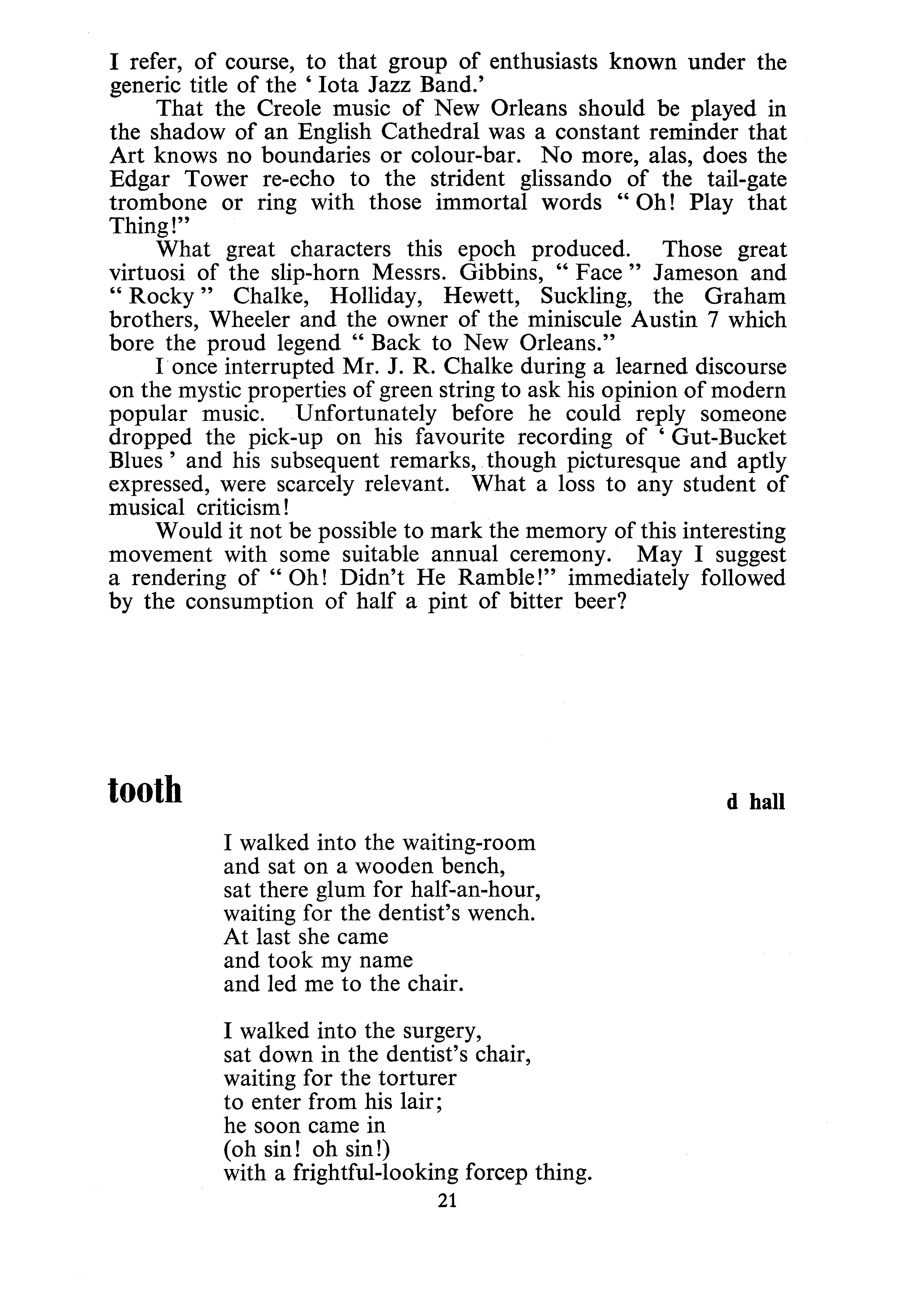
I walked into the waiting-room and sat on a wooden bench, sat there glum for half-all-hour, waiting for the dentist's wench. At last she came and took my name and led me to the chair.
I walked into the surgery, sat down in the dentist's chair, waiting for the torturer to enter from his lair; he soon came in (oh sin! oh sin!) with a frightful-looking forcep thing. 21

He set it on the table and rubbed his hands with glee, ", thinking of all the things he'd do . to the most unhappy me. He took a rubber gas-mask and put it to my nose, and when he put the gas full on I trembled from tip to toes.
I started counting up to ten but didn't get very far by five the gas was overcoming at six I saw a star, it was hell at seven but soon it was Heaven I was deep in the clutches of gas. I dreamt of giants with giant pliers chasing after my tooth which, like them, was big and bad and had been since its youth. But they caught me at last and held me fast while they wrenched out that infamous tooth.
I awoke at last to find myself in the chair at the dentist's place, the dentist striding up and down with a grin all over his face; here's my shirt bloody stained - and what had I gained by having my tooth torn out?
I left the dismal dentist's den and shut the sllabby door, not feeling down in the dumps at all but glad to be free once more for my tooth was gone! my tooth \vas gone. I had less teeth now but "vho could care? Another and a better would soon be there.
... tramp, tramp, tramp went the stout corps boots as the party, helped and guided by natives, completed what was laughingly described as a Circuit des Alpes. Paris en route had not prepared anyone for the terrain around Grenoble and some of the hills looked very, very big. But King's men are King's men and not a soul was missing when, one moonlit night, due homage was paid to Lamartine by the lakeside at BOllrget .

two short studies a tborne
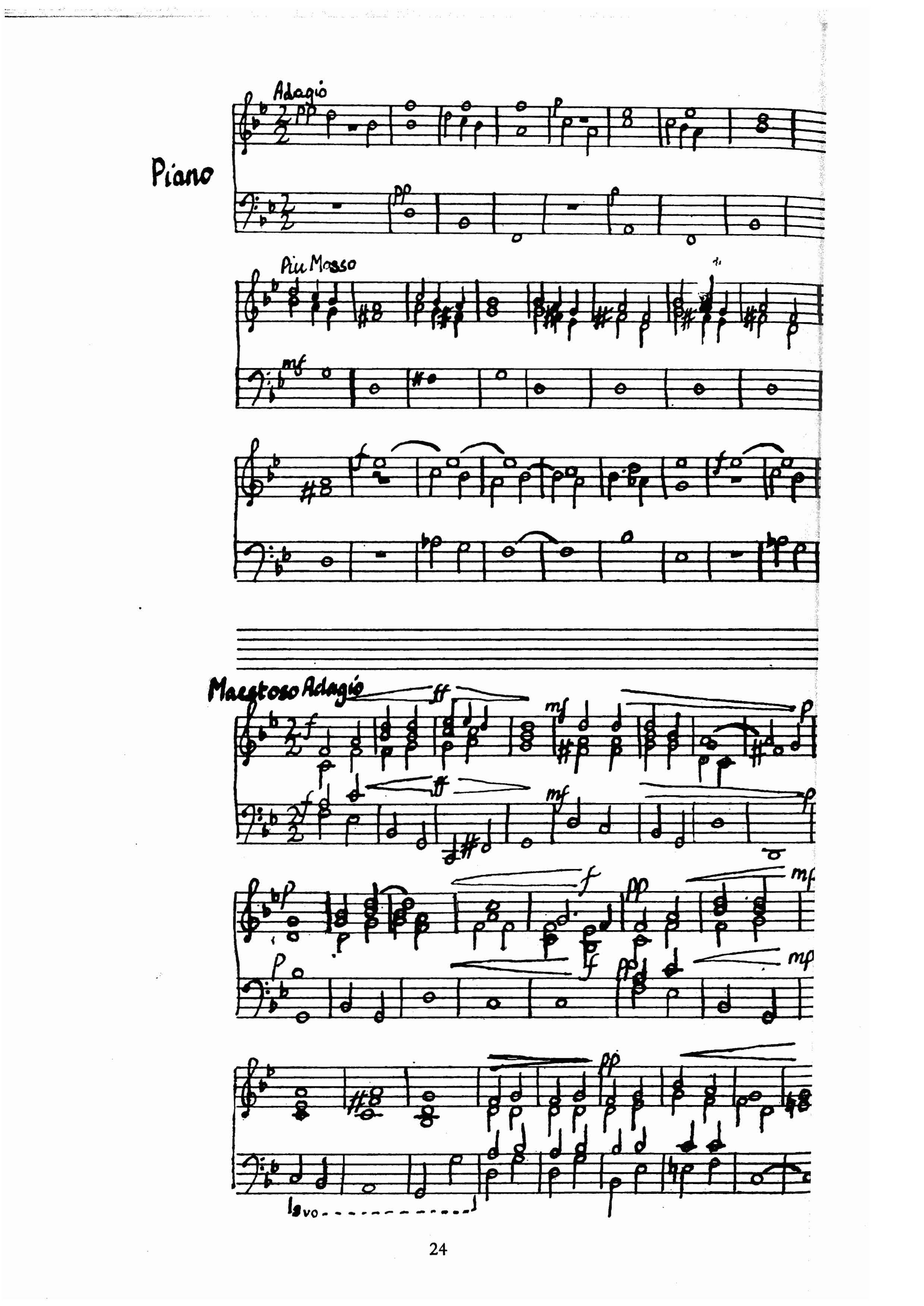
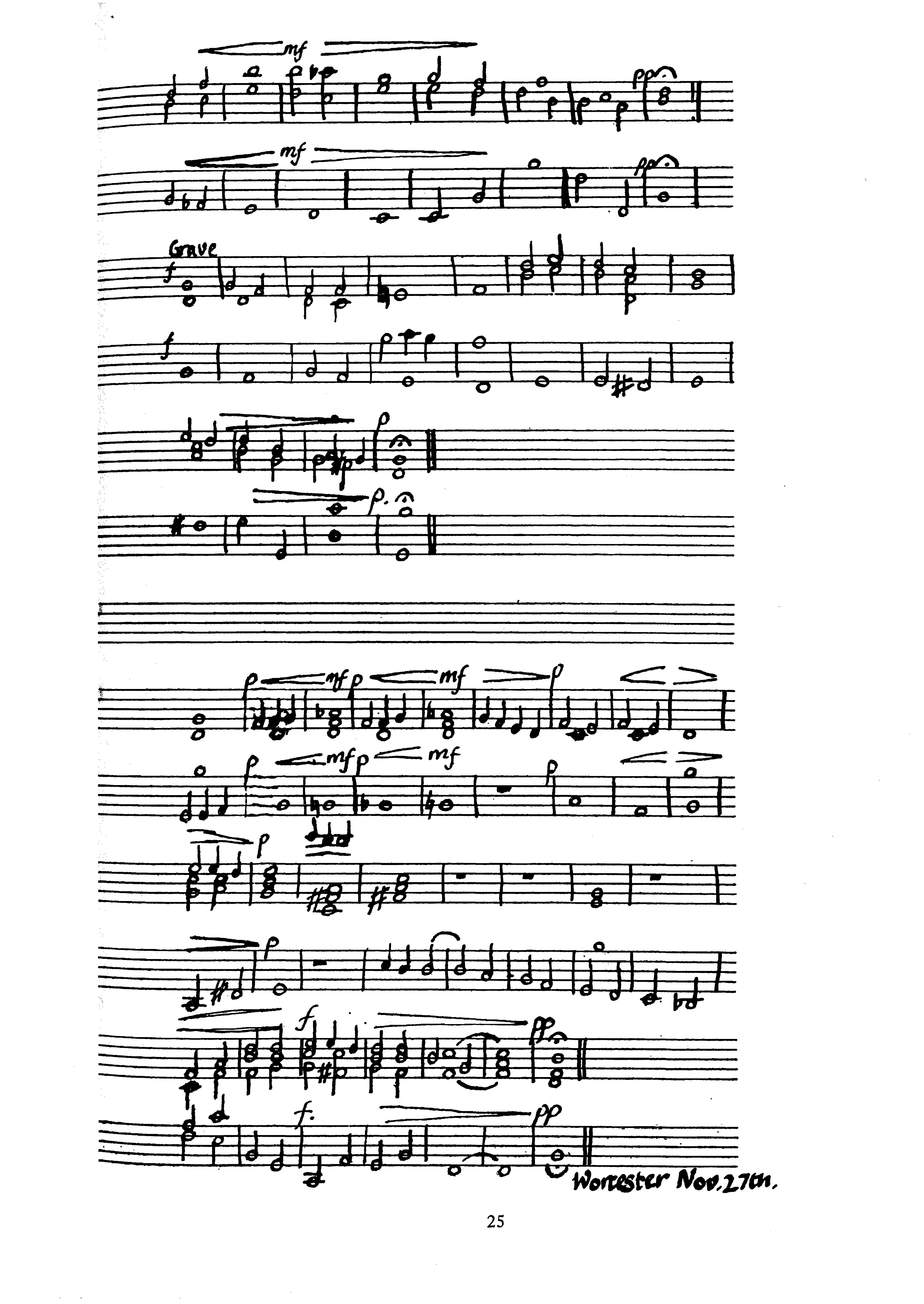
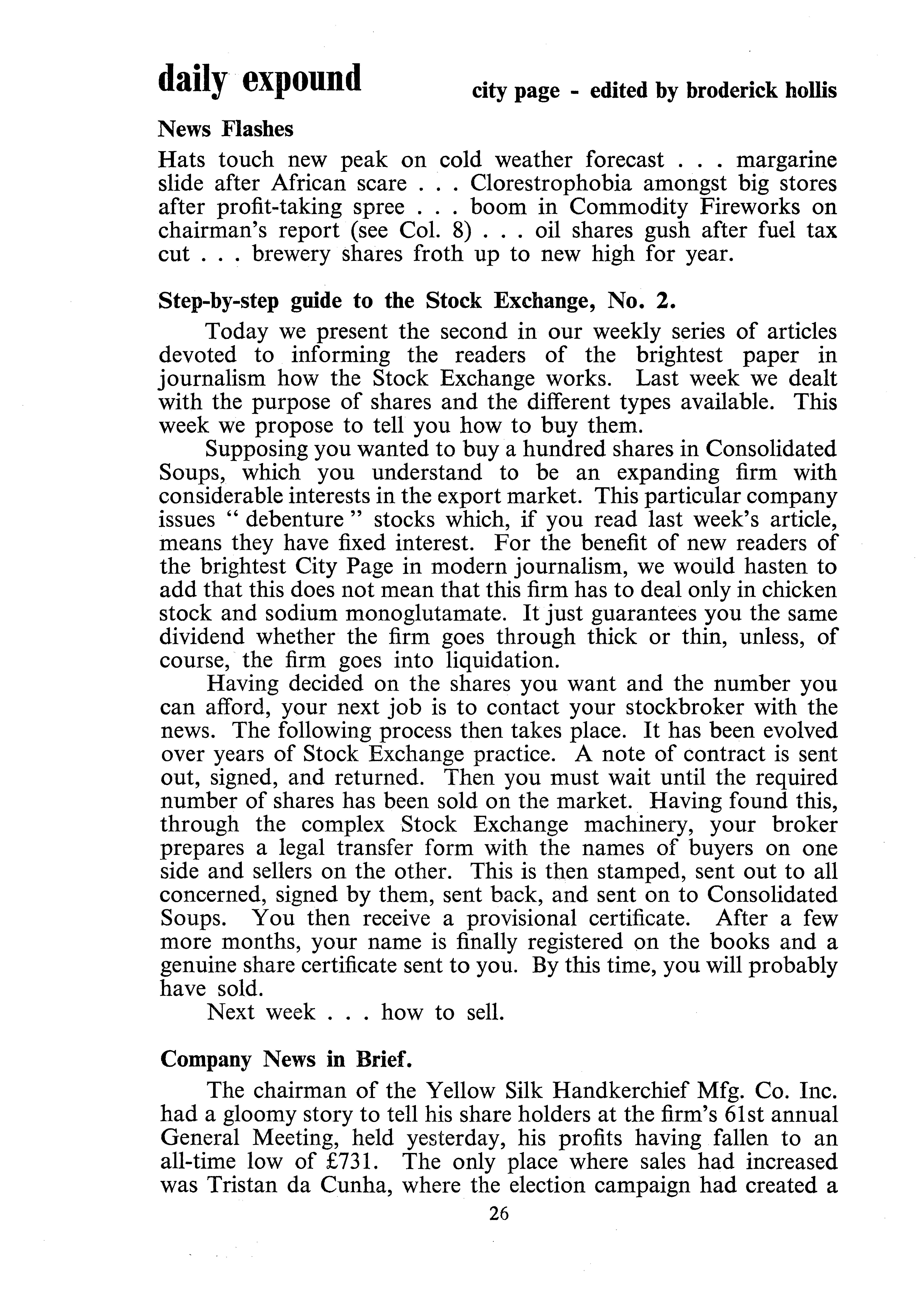
city page - edited by broderick hollis
Hats touch new peak on cold weather forecast ... margarine slide after African scare ... Clorestrophobia amongst big stores after profit-taking spree . . . boom in Commodity Fireworks on chairman's report (see Col. 8) ... oil shares gush after fuel tax cut ... brewery shares froth up to new high for year.
Step-by-step guide to the Stock Exchange, No. 2.
Today we present the second in our weekly series of articles devoted to informing the readers of the brightest paper in journalism how the Stock Exchange works. Last week we dealt with the purpose of shares and the different types available. This week we propose to tell you how to buy them.
Supposing you wanted to buy a hundred shares in Consolidated Soups, which you understand to be an expanding firm with considerable interests in the export market. This particular company issues "debenture" stocks which, if you read last week's article, means they have fixed interest. For the benefit of new readers of the brightest City Page in modern journalism, we would hasten to add that this does not mean that this firm has to deal only in chicken stock and sodium mo-noglutamate. It just guarantees you the same dividend whether the firm goes through thick or thin, unless, of course, the firm goes into liquidation.
Having decided on the shares you want and the number you can afford, your next job is to contact your stockbroker with the news. The following process then takes place. It has been evolved over years of Stock Excl1ange practice. A note o-f contract is sent out, signed, and returned. Then you must wait until the required number of shares has been sold on the market. Having found this, through the complex Stock Exchange machinery, your broker prepares a legal transfer forlTI with the names of buyers on one side and sellers on the other. This is then stamped, sent out to all concerned, signed by them, sent back, and sent on to Consolidated Soups. You then receive a provisional certificate. After a few more months, your name is finally registered on the books and a genuine share certificate sent to you. By this time, you will probably have sold.
Next week ... how to sell.
The chairman of the Yellow Silk Handkerchief Mfg. Co. II1C. had a gloomy story to tell his share holders at the firm's 61st annual General Meeting, held yesterday, his profits having fallen to an all-time low of £731. The only place where sales had increased was Tristan da Cunha, where the election campaign had created a 26
demand for yellow squares for the People's Unionist Movement candidate and supporters. The chairman regretted that recent negotiations to hold elections there on an annual basis had proved fruitless.
The dispute at the Bugheaton factory of Buglars and Braithwaite, packing agents for the Outer Mongolian Rhubarb Growers' Guild, continued for the fourth day running. Workers are demanding the same recognition as the egg packers whose "tedious grading work is lightened by stamping lions on their product." (Shades of Roman Gladiators). They want to stamp their rhubarb with letters indicating the place of origin as "we also feel that Outer Mongolian rhubarb is something to shout about." The management feels that whereas consumers do not object to lions on egg shells, they might object to some sort of stamping on rhubarb skins. Meanwhile supplies of imported rhubarb have been diverted to the local egg packing station, where there is excess capacity. Worl<ers there are delighted. "They love the tarantulas and funny Mongolian stories mixed up with the rhubarb leaves," a spokesman said.
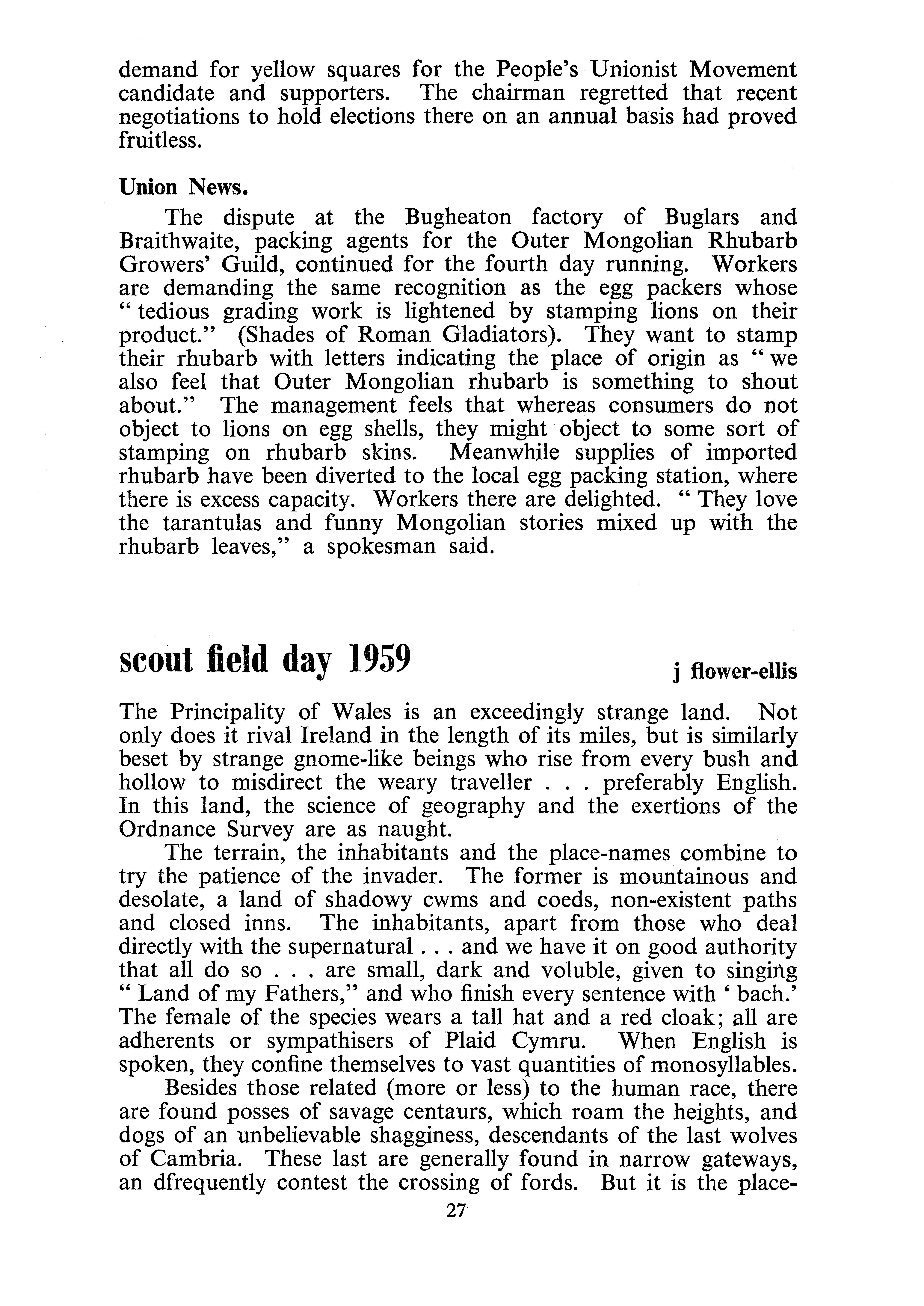
The Principality of Wales is an exceedingly strange land. Not only does it rival Ireland in the length of its miles, but is similarly beset by strange gnome-like beings who rise from every bush and hollow to misdirect the weary traveller ... preferably English. In this land, the science of geography and the exertions of the Ordnance Survey are as naught.
The terrain, the inhabitants and the place-names combine to try the patience of the invader. The former is mountainous and desolate, a land of shadowy cwms and coeds, non-existent paths and closed inns. The inhabitants, apart from those who deal directly with the supernatural ... and we have it on good authority that all do so . . . are small, dark and voluble, given to singing " Land of my Fathers," and WllO finish every sentence with' bach.' The female of the species wears a tall hat and a red cloak; all are adherents or sympathisers of Plaid Cymru. When English is spoken, they confine themselves to vast quantities of monosyllables. Besides those related (more or less) to the human race, there are found posses of savage centaurs, which roam the heights, and dogs of an unbelievable shagginess, descendants of the last wolves of Cambria.These last are generally found in narrow gateways, an dfrequently contest the crossing of fords. But it is the place
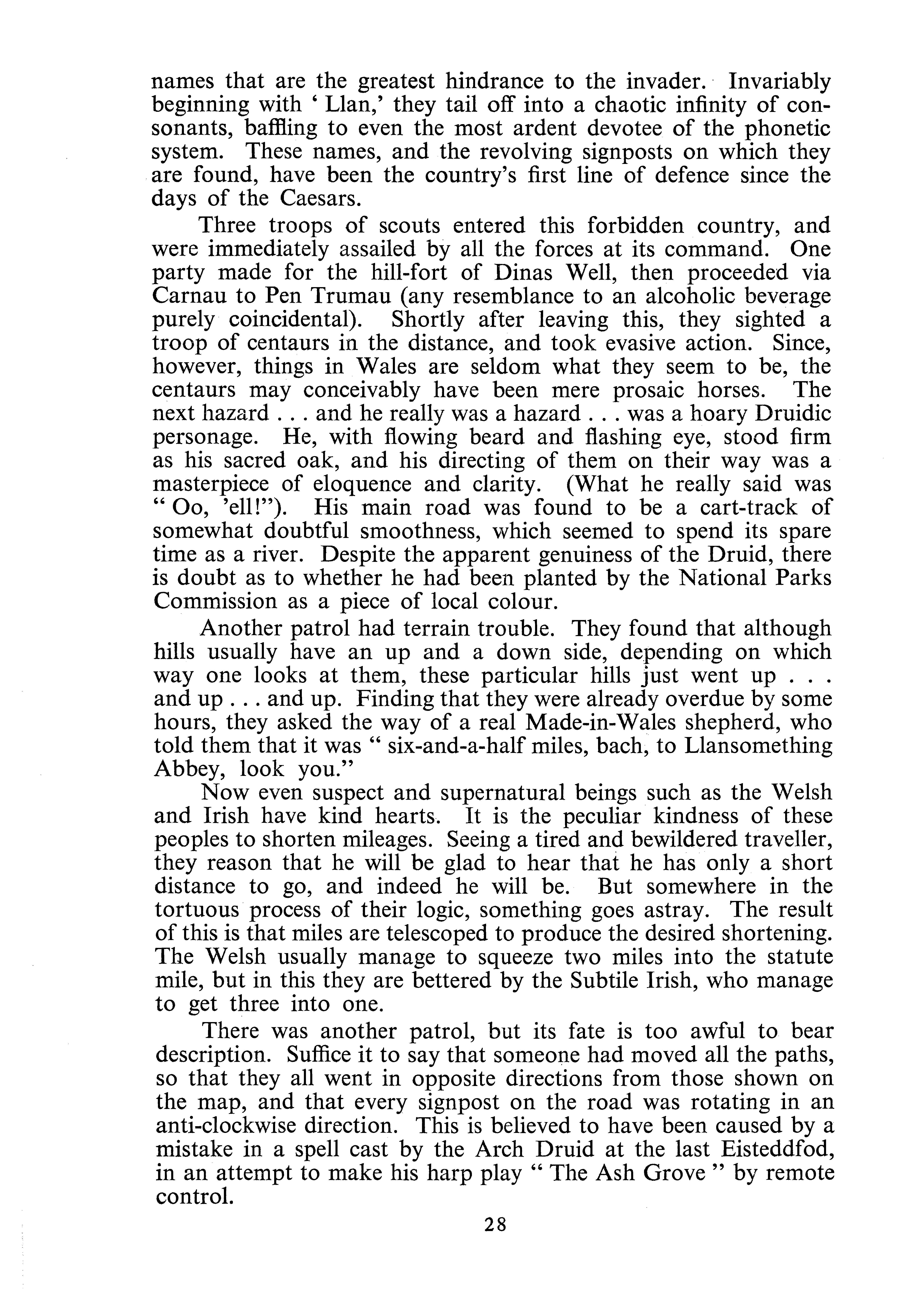
names that are the greatest hindrance to the invader.' Invariably beginning with' Llan,' they tail off into a chaotic infinity of consonants, baffling to even the most ardent devotee of the phonetic system. These names, and the revolving signposts on which they are found, have been the country's first line of defence since the days of the Caesars.
Three troops of scouts entered this forbidden country, and were immediately assailed by all the forces at its command. One party made for the hill-fort of Dinas Well, then proceeded via Carnau to Pen Trutnau (any resemblance to an alcoholic beverage purely coincidental). Shortly after leaving this, they sighted a troop of centaurs in the distance, and took evasive action. Since, however, things in Wales are seldom what they seem to be, the centaurs may conceivably have been mere prosaic horses. The next 11azard and he really was a hazard was a hoary Druidic personage. He, with flowing beard and flashing eye, stood firm as his sacred oak, and his directing of them on their way was a masterpiece of eloquence and clarity. (What he really said was "00, 'ell!"). His main road was found to be a cart-track of somewhat doubtful smoothness, \Jvhich seemed to spend its spare time as a river. Despite the apparent genuiness of the Druid, there is doubt as to whether he had been planted by the National Parks Commission as a piece of local colour.
Another patrol had terrain trouble. They found that although hills usually have an up and a down side, depending on which way one looks at them, these particular hills just went up ... and up ... and up. Finding that they were already overdue by some hours, they asked the way of a real shepherd, who told them that it was " six-and-a-half miles, bach, to Llansolllething Abbey, look you."
Now even suspect and supernatural beings such as the Welsh and Irish have kind hearts-. It is the peculiar kindness of these peoples to shorten mileages. Seeing a tired and bewildered traveller, they reason that he will be glad to hear that he has only a short distance to go, and indeed he will be. But somewhere in the tortuous -process of their logic, something goes astray_ The result of this is that miles are telescoped to produce the desired shortening. The Welsh usually manage to squeeze two miles into the statute mile, but in this they are bettered by the Subtile Irish, who manage to get three into one.
There was another patrol, but its fate is too awful to bear description. Suffice it to say that someone had moved all the paths, so that they all went in opposite directions from those shown on the map, and that every signpost on the road was rotating in an anti-clockwise direction. This is believed to have been caused by a mistake in a spell cast by the Arch Druid at the last Eisteddfod, in an attempt to make his harp play" TIle Ash Grove " by remote control.
Those who have followed the adventures of the intrepid patrols to this point, through a maze of verbiage, will be relieved to hear that they finally escaped, disguised as leeks stamped "for export only," in the back of an eastbound truck. And for those who may be offended by any aspersions cast upon the Welsh character,to them let it be said, firstly that I am unrepentant, and lastly "Remember Twickenham 1955."
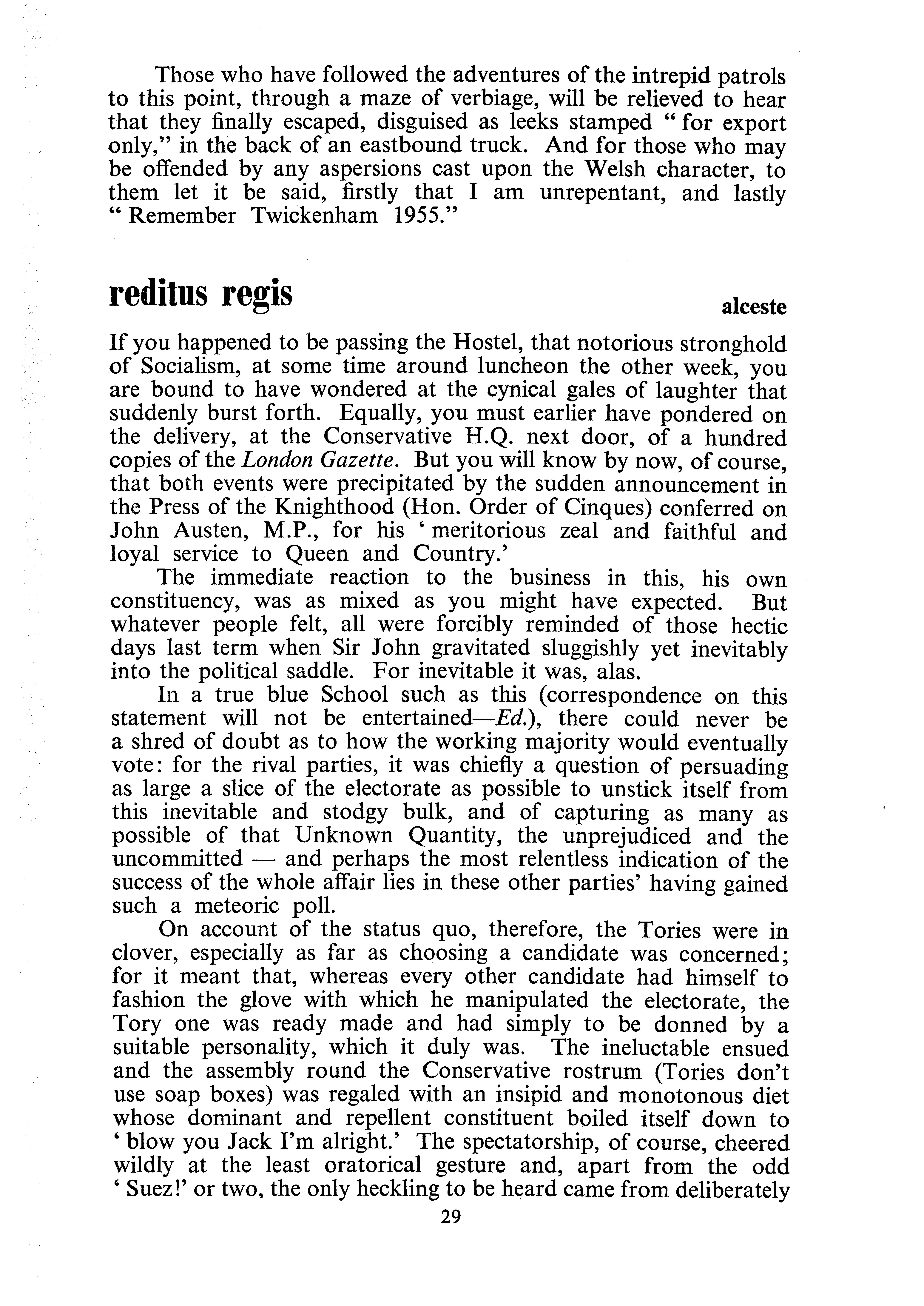
If you happened to 'be passing the Hostel, that notorious stronghold .of Socialism, at some time around luncheon the other week, you are bound to have wondered at the cynical gales of laughter that suddenly burst forth. Equally, you must earlier have pondered on the delivery, at the Conservative H.Q. next door, of a hundred copies of the London Gazette. But you will know by now, of course, that both events were precipitated by the sudden announcement in the Press of the Knighthood (Hon. Order of Cinques) conferred on John Austen, M.P., for his 'meritorious zeal and faithful and loyal service to Queen and Country.'
The immediate reaction to the business in this, his own constituency, was as mixed as you might have expected. But whatever people felt, all were forcibly reminded of those hectic days last term when Sir John gravitated sluggishly yet inevitably into the political saddle. For inevitable it was, alas.
In a true blue School such as this (correspondence on this statement will not be entertained-Ed.), there could never be a shred of doubt as to how the working majority would eventually vote: for the rival parties, it was chiefly a question of persuading as large a slice of the electorate as possible to unstick itself from this inevitable and stodgy bulk, and of capturing as many as possible of that Unknown Quantity, the unprejudiced and the uncommitted - and perhaps the most relentless indication of the success of the whole affair lies in these other parties' having gained such a meteoric poll.
On account of the status quo, therefore, the Tories were in clover, especially as far as choosing a candidate was concerned; for it meant that, whereas every other candidate had himself to fashion the glove with which he manipulated the electorate, the Tory one was ready made and had simply to be donned by a suitable personality, which it duly was. The ineluctable ensued and the assembly round the Conservative rostrum (Tories don't use soap boxes) was regaled with an insipid and monotonous diet whose dominant and repellent constituent boiled itself down to , blow you Jack I'm alright.' The spectatorship, of course, cheered wildly at the least oratorical gesture and, apart from the odd , Suez!' or two, the only heckling to be heard came from deliberately 29

infiltrated supporters of the Left. Thus, considering the Tory Party as a whole, we had a rather odd set-up altogether from a mechanics point of view, in that a vast amount of energy was put in, and nothing came out. (I can just see this edition being publicly burnt, Luther-style, by the Physics Department - the history books will probably refer to it as 'Frisby Burning The Bull ').
As far as the Independent Liberal Party was concerned, on the other hand, the situation was different from the toe-nails up. Here was the candidate who gave birth to the party - indeed he WAS the party, and since it was the outcome of personal conviction, the party had as its distinguishing features a sharp vigour and a striking sense of sincerity. These very characteristics, however, meant that the I.L.P. could never be a real political party in the accepted meaning: the concepts of genuineness and politics are frankly not compatible. To the schoolboy, uncorroded by adult experience and therefore ingenuous and somewhat idealistic, this self-evident genuineness and crusading fervour appealed immensely; the Socialist accusation, highly justifiable from a political point of view, that Liberal policy was either impracticable or plain non-existent, went completely unheeded, and the silence of the crowd at Liberal speeches was not, as a Labour pamphlet maintained, out of respect for a dying party, but came from a consuming interest in the opinions being expressed.
Seen in the light of these considerations, the cataclysm (Pock. Ox. P. 117) that was the I.L.P.'8 success is more easily accounted 30
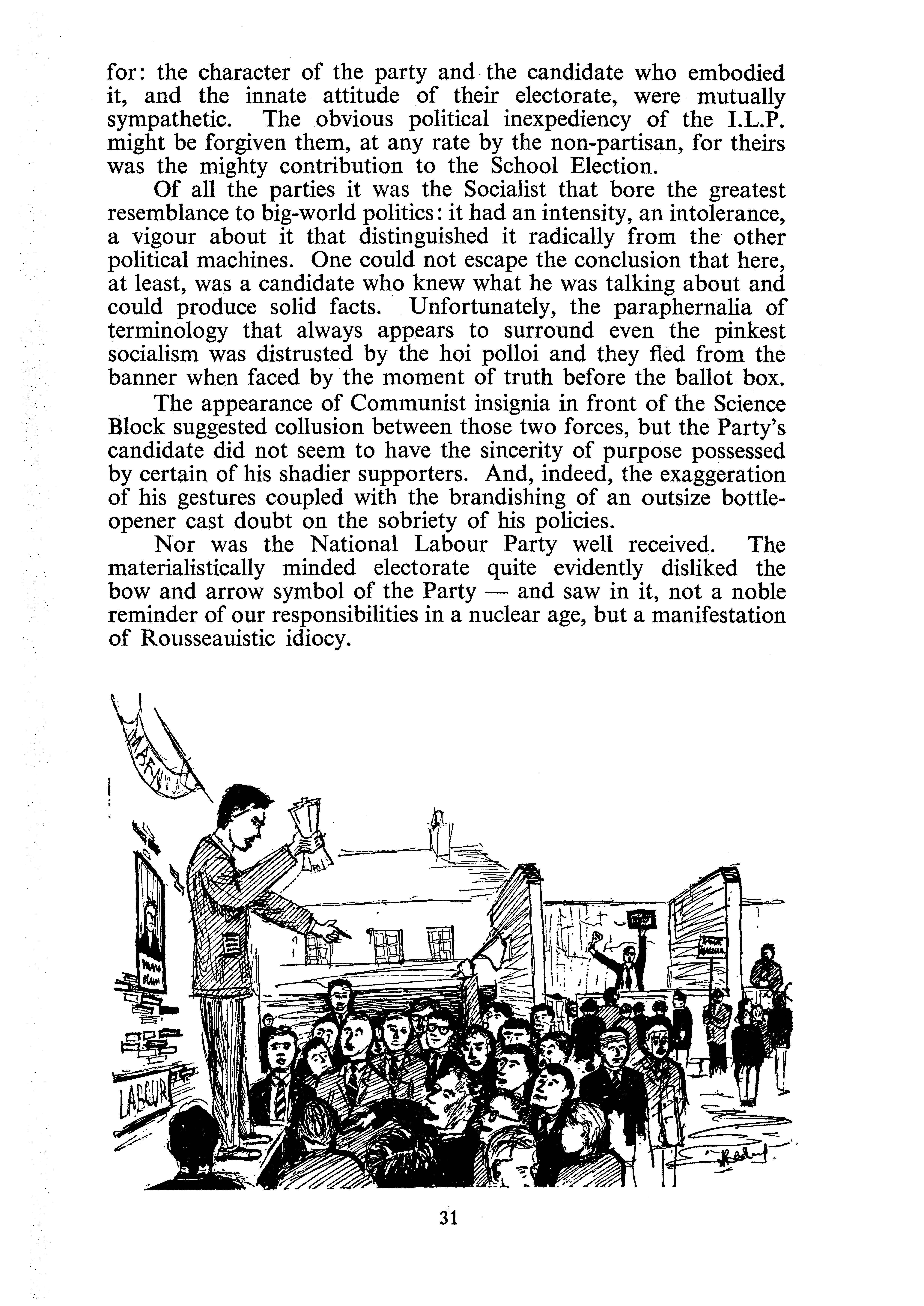
for: the character of the party and· the candidate who embodied it, and the innate attitude of their electorate, were mutually sympathetic. The obvious political inexpediency of the I.L.P. might be forgiven them, at any rate by the non-partisan, for theirs was the mighty contribution to the School Election.
Of all the parties it Vias the Socialist that bore the greatest resemblance to big-world politics: it had an intensity, an intolerance, a vigour about it that distinguished it radically from the other political machines. One could not escape the conclusion that here, at least, was a candidate who knew what he was talking about and could produce solid facts. . Unfortunately, the paraphernalia of terminology that always appears to surround even the pinkest socialism was distrusted by the hoi polloi and they fled from the banner when faced by the moment of truth before the ballot box.
The appearance of Communist insignia in front of the Science Block suggested collusion between those two forces, but the Party's candidate did not seem to have the sincerity of purpose possessed by certain of his shadier supporters. And, indeed, the exaggeration of his gestures coupled with the brandishing of an outsize bottleopener cast doubt on the sobriety of his policies.
N or was the National Labour Party well received. The materialistically minded electorate quite evidently disliked the bow and arrow symbol of the Party - and saw in it, not a noble reminder of our responsibilities in a nuclear age, but a manifestation of Rousseauistic idiocy.
But the day of decision came and the electorate gathered in College Hall to hear the final pleas. It was quite clear from the sleek, well fed appearance of the voters that their particular social contract had been long since sealed - the Tories were in.
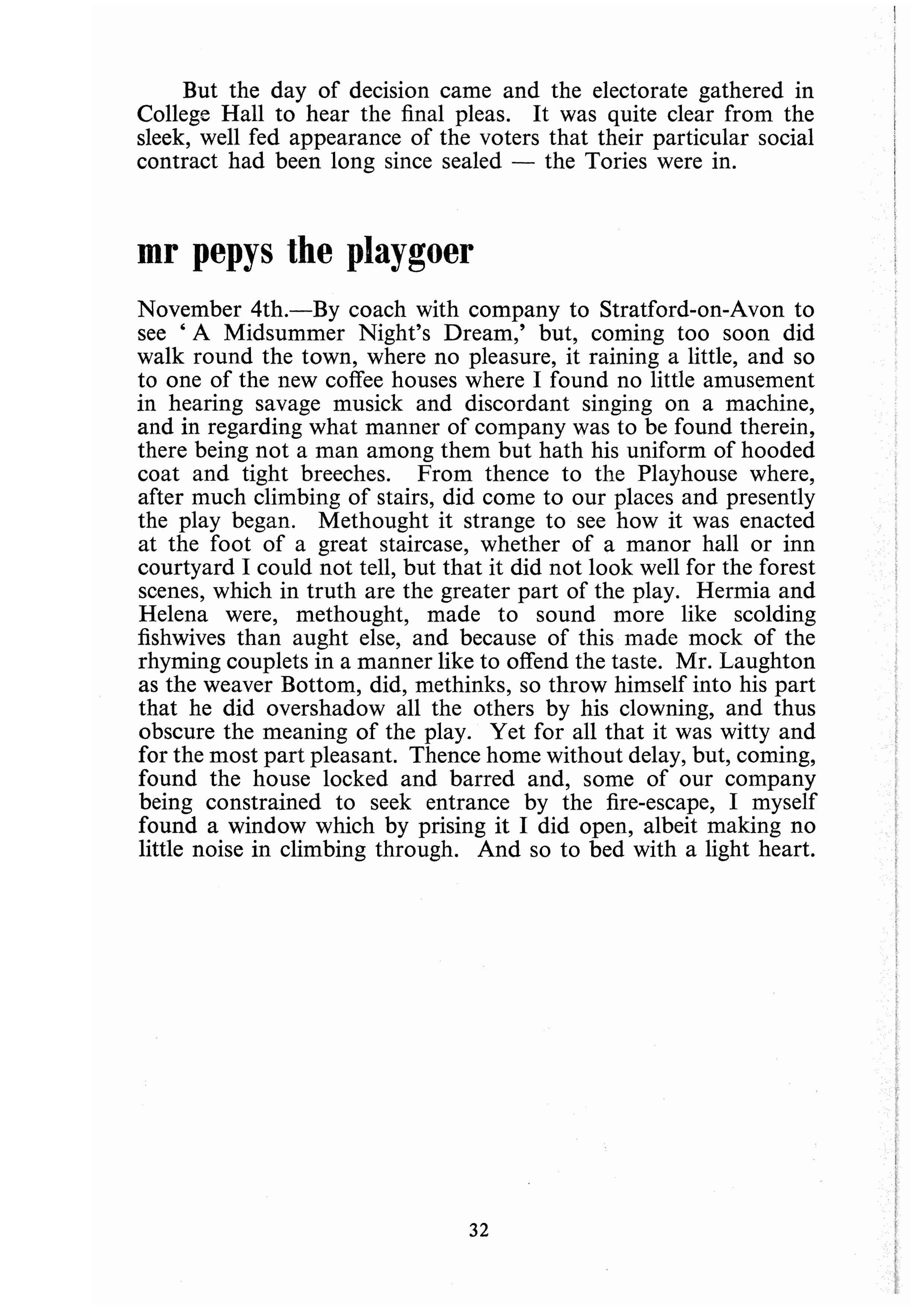
November 4th.-By coach with company to Stratford-on-Avon to see 'A Midsummer Night's Dream,' but, coming too soon did walk round the town, where no pleasure, it raining a little, and so to one of the new coffee houses where I found no little amusement in hearing savage mu sick and discordant singing on a machine, and in regarding what manner of company was to be found therein, there being not a man among them but hath his uniform of hooded coat and tight breeches. From thence to the Playhouse where, after much climbing of stairs, did come to our places and presently the play began. Methought it strange to see how it was enacted at the foot of a great staircase, whether of a manor hall or inn courtyard I could not tell, but that it did not look well for the forest scenes, which in truth are the greater part of the play. Hermia and Helena were, methought, made to sound more like scolding fishwives than aught else, and because of this made mock of the rhyming couplets in a manner like to offend the taste. Mr. Laughton as the weaver Bottom, did, methinks, so throw himself into his part
that he did overshadow all the others by his clowning, and thus obscure the meaning of the play. Yet for all that it was witty and for the most part pleasant. Thence home without delay, but, coming, found the house locked and barred and, some of our company being constrained to seek entrance by the fire-escape, I myself found a window which by prising it I did open, albeit making no little noise in climbing through. And so to bed with a light heart.



The beginning of this term saw the creation of this society which now consists of 30 members - though not think so from the subscriptions. collected. The members are divided into two groups; the first consists entirely of beginners who are constructing elementary sets under the instruction of the more advanced members (the rumour that this is a case of the blind leading the blind is completely untrue and in any case no one has any proof of it). The second and mote advanced group is attem'pting to build various pieces of .equipment. Progress is rather slow on this term's project - an audio oscillator - and the power supplies were finished only one week from the end of term. Gracing the science block at present is a television set of dubious origin. We spent one glorious week taking it to pieces and are now thinking of presenting the cabinet to. Mr. Wilson - perhaps there's room for his golf clubs in it. Activities came to a close with an invasion of the B.B.C. transmitting station at Droitwich. In the two and a half hours we were there the transmitter only went off the air for two secol.lds despite the fact that we had with us one of the greatest dismantlers known to modern science. Talks on designing one's own radio are planned for next term and later it is hoped to place some entries for the Radio Amateurs' Examination.
T.G.
The Art Society's activities have been quite varied this term. The first meeting took the form of a light-hearted demonstration in which, by having various members of the society helping to copy a famous painting, it was intended to show how different people , saw' the picture. Action painting had arrived at King's. At the second meeting Mr. Vivian gave another of his excellent practical demonstrations, taking us through the various stages of composition and painting of a still life group. Two films were seen: the first a French production of Goya's engravings depicting' The Disasters of War' which managed to get across excellently the sinister atmosphere and the precision of the drawing by a combination of and subtle filming. Accompanying this was a B.B.C. film on the life and work of Graham Sutherland showing how he comes to .produce some of the weird designs that he does. The term concluded with nine members giving short illustrated talks of their ideas of the nature of beauty. A.B.

Although many of our expert speakers left last year we were able to dig out a good deal of new talent from wrious nooks, crannies and stones or wherever speakers hibernate during the Summer term.
This year marked the first joint debate with the Girls' Grammar School and a return 'match' with the Alice Ottley. The Girls' Grammar debate was very heated and in spite of rather conventional platitudes from some of the girls, who were new to debating, many people seemed to hold strong views upon the Monarchy. A particular republican, especially, resembled a yo-yo, for no sooner was he down than he popped up again to make another point.
Also during the term a 'hat' and a 'balloon' debate was held. In the' balloon' the Ambassador Extraordinary to Lundy, Mr. Houlbrooke, was almost unanimously given the parachute as it transpired that he was the last bastion of Lundy against the hordes of trippers sent to attack that island by Devon County Council, and against boatloads of superannuated science masters dispatched from Wales by a Mr. Jones-Loganberry .
D. W-J.
Last season's standard is proving hard to maintain (and that is a polite way of putting it); the club gained second place in both open-age divisions and also in the Junior Division 1, being thwarted each time by the College for the Blind. The Junior " B" team. came third in the third division, whereas they were ordered to come forth.
The only possible victory of the 1st team last ·term is being withheld temporarily by the apparent unwillingness of adjudicators to concede us a win. This match was against Prince Henry's School, Evesham, an occasion marked by an abundance of sweets on the top boards and the appearance of a feminine opponent in the 2nd team, whom Wakley most unchivalrously defeated in six moves! Their first board refused to resign despite his position " because it would sound so bad in assembly the next morning. ".
Mr. Bonham's prowess was shown when he claimed wins. for all the games against the Blind College to be adjudicated, except one. Both his under 15 teams had already beaten us. Neither did we excel ourselves against the Grammar School. We did draw, however, in the 1st team despite the contribution of only half-apoint by the last three boards.
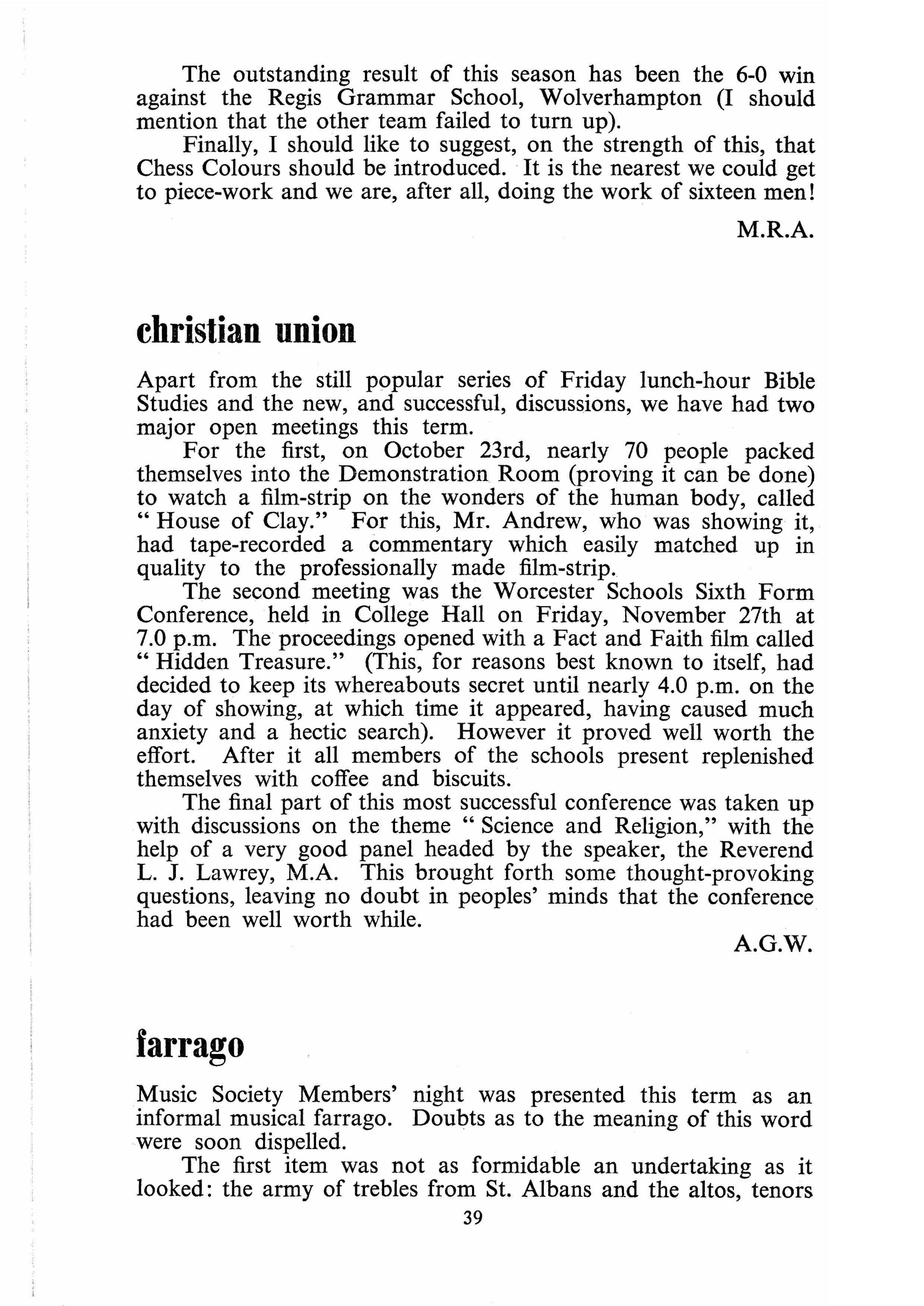
The outstanding result of this season has been the 6-0 win against the Regis Grammar School, Wolverhampton (I should mention that the other team failed to turn up).
Finally, 1 should like to suggest, on the strength of this, that Chess Colours should be introduced. It is the nearest we could get to piece-work and we are, after all, doing the work of sixteen men!
Apart from the still popular series of Friday lunch-hour Bible Studies and the new, and successful, discussions, we have had two major open meetings this term.
For the first, on October 23rd, nearly 70 people packed themselves into the Demonstration Room (proving it can be done) to watch a film-strip on the wonders of the human body, called "House of Clay." For this, Mr. Andrew, who was showing it, had tape-recorded a commentary which easily matched up in quality to the professionally made film-strip.
The second meeting was the Worcester Schools Sixth Form Conference, held in College Hall on Friday, November 27th at 7.0 p.m. The proceedings opened with a Fact and Faith film called " Hidden Treasure." (This, for reasons best known to itself, had decided to keep its whereabouts secret until nearly 4.0 p.m. on the day of showing, at which time it appeared, having caused much anxiety and a hectic search). However it proved well worth the effort. After it all members of the schools present replenished themselves with coffee and biscuits.
The final part of this most successful conference was taken up with discussions on the theme "Science and Religion," with the help of a very good panel headed by the speaker, the Reverend L. J. Lawrey, M.A. This brought forth son1e thought-provoking questions, leaving no doubt in peoples' minds that the conference had been well worth while.
A.G.W.
Music Society Members' night was presented this term as an informal musical farrago. Doubts as to the meaning of this word were soon dispelled.
The first item was not as formidable an undertaking as it looked: the army of trebles from St. Albans and the altos, tenors 39

and basses which surrounded Mr. West at the piano produced an interesting rendering of Bach's " Break forth, 0 beauteous heavenly light" and pursued it with "Christmas Song" by Praetorius. Dimmick, from the lower fourths, played Beethoven's "Bagatelle in Fminor" on the piano with remarkable aplomb for a boy of his age. Culyer at the piano, Randle, J. on the 'cello and Caton and West, P. with a violin apiece gave a worthy impression of an augmented Max Jaffa trio with a performance of " Gavotte" by Frank Bridges. The violinists left Culyer and Randle playing Mozart's "Ave Verull1" and Schubert's "Serenade."
To begin with, Thorne's horn was cold and therefore unproductive, but as soon as it was warmed up one could see that his playing of " Out of the Deep" by Morely was very good for someone who had been learning the instrument only six months. Two items of a light-hearted nature were enthusiastically received. For the first Hardman introduced the Premiere and the Derniere of his .Trumpet Tango which Sheffer played facing into the corner of tIle room so as not to startle the audiel1ce.Anything M'luds Preece, Austen, Hawes, York and Hardman sang about "The Stately Homes of England" was taken cum grano siftae as the words and music were by Noel Coward.
On a more serious note, or notes, K. Kerney played Coleridge Taylor's "Valse Suite No. 6" on the piano with great dexterity. There were two other pianists, one of wll0m was Steed who performed Chopin's 6th Prelude and Dvorak's "Humoresques." The other evidently was not satisfied with "To the Spring" by Grieg as he also played "Begone Dull Care" and "The Scarlet Sarafin " by Titov on the clarinet. This jack-of-all-trades - and he was all right, too - was Rogers.
A. P. Jackson bowed (pronounced as in woad) through two movetnents of a Vivaldi sonata with his 'cello. The Male Voice Ensemble (a polite way of saying that St. Albans has gone to bed) entreated Moses to "Go down, Moses, go" and bid goodnight with the inevitable "Deep River."
Had anyone lingered long enough, he would have heard " The Stately Homes of England " being sung over the washing-up. That was the spirit of the evening.
G.H.
This term, owing to a generous gift from Mr. Kittermaster and the purchase of many new books, the library was augmented by several hundred volumes. This increase is offset by the singular lack of borrowers which has reached the point that the librarians almost outnumber the clientele, and they hope soon to be able to offer a person-to-person service.
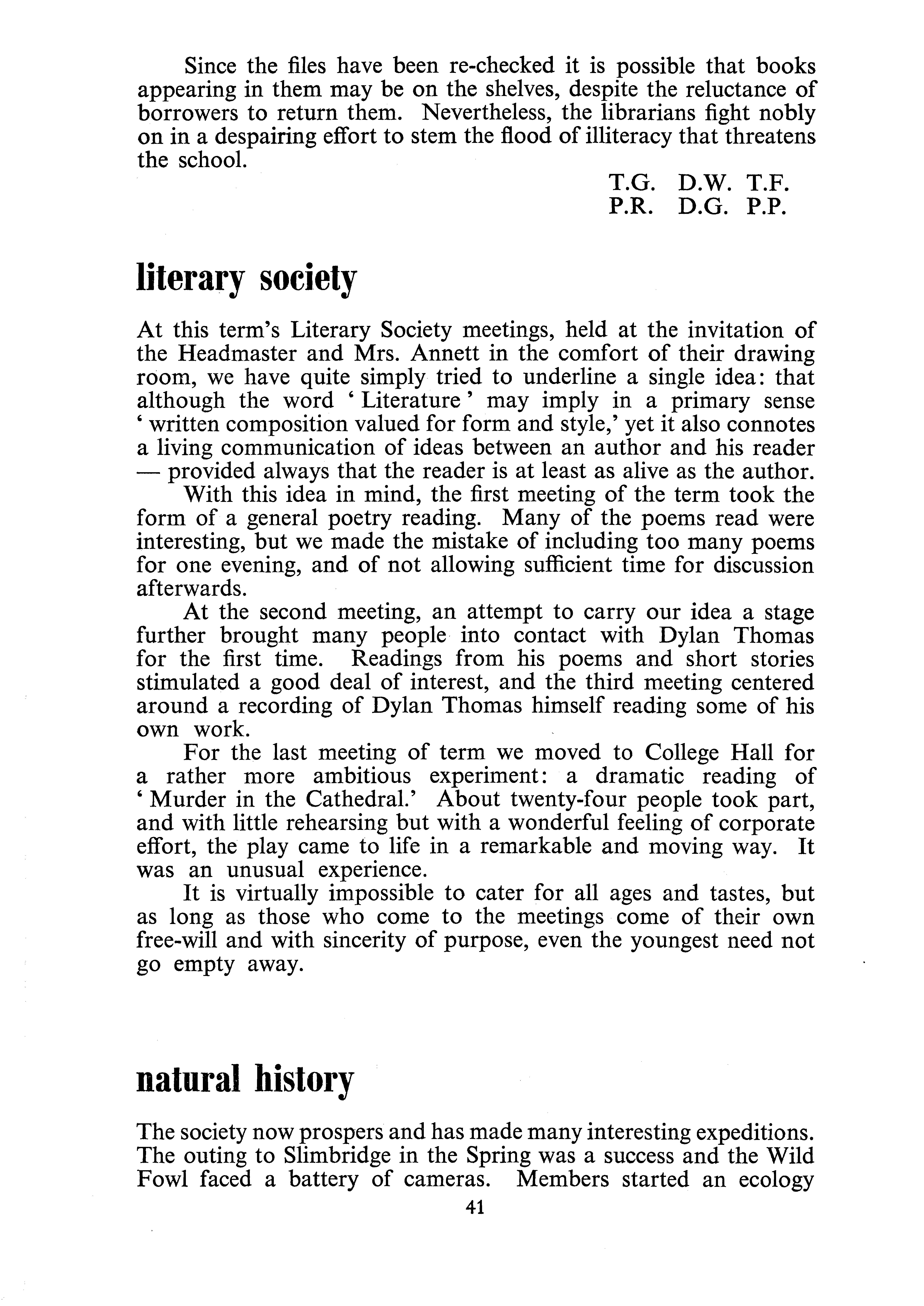
Since the files have been re-checked it is possible that books appearing in them may be on the shelves, despite the reluctance of borrowers to return them. Nevertheless, the librarians fight nobly on in a despairing effort to stem the flood of illiteracy that threatens the scllool.
T.G.
D.W. T.F. P.R. D.G. P.P.
At this term's Literary Society meetings, held at the invitation of the Headmaster and Mrs. Annett in the comfort of their drawing room, we have quite simply tried to underline a single idea: that although the word 'Literature' may imply in a primary sense , written composition valued for form and style,' yet it also connotes a living communication of ideas between an author and his reader - provided always that the reader is at least as alive as the author. With this idea ill mind, the first meeting of the term took the form of a general poetry reading. Many of the poems read were interesting, but we made the mistake of including too many poems for one evening, and of not allowing sufficient time for discussion afterwards.
At the second meeting, an attempt to carry our idea a stage further brought many people- into contact with Dylan Thomas for the first time. Readings from his poems and short stories stimulated a good deal of interest, and the third meeting centered around a recording of Dylan Thomas himself reading some of his own work.
For the last meeting of term we moved to College Hall for a rather more ambitious experiment: a dramatic reading of , Murder in the Cathedral.' About twenty-four people took part, and with little rehearsing but with a wonderful feeling of corporate effort, the play came to life in a remarkable and moving way. It was an unusual experience. It is virtually in1possible to cater for all ages and tastes, but as long as those who come to the meetings come of their own free-will and with sincerity of purpose, even the youngest need not go empty away.
The society now prosp'ers and has made many interesting expeditions. The outing to Slimbridge in the Spring was a success and the Wild Fowl faced a battery of cameras. Members started an ecology 41
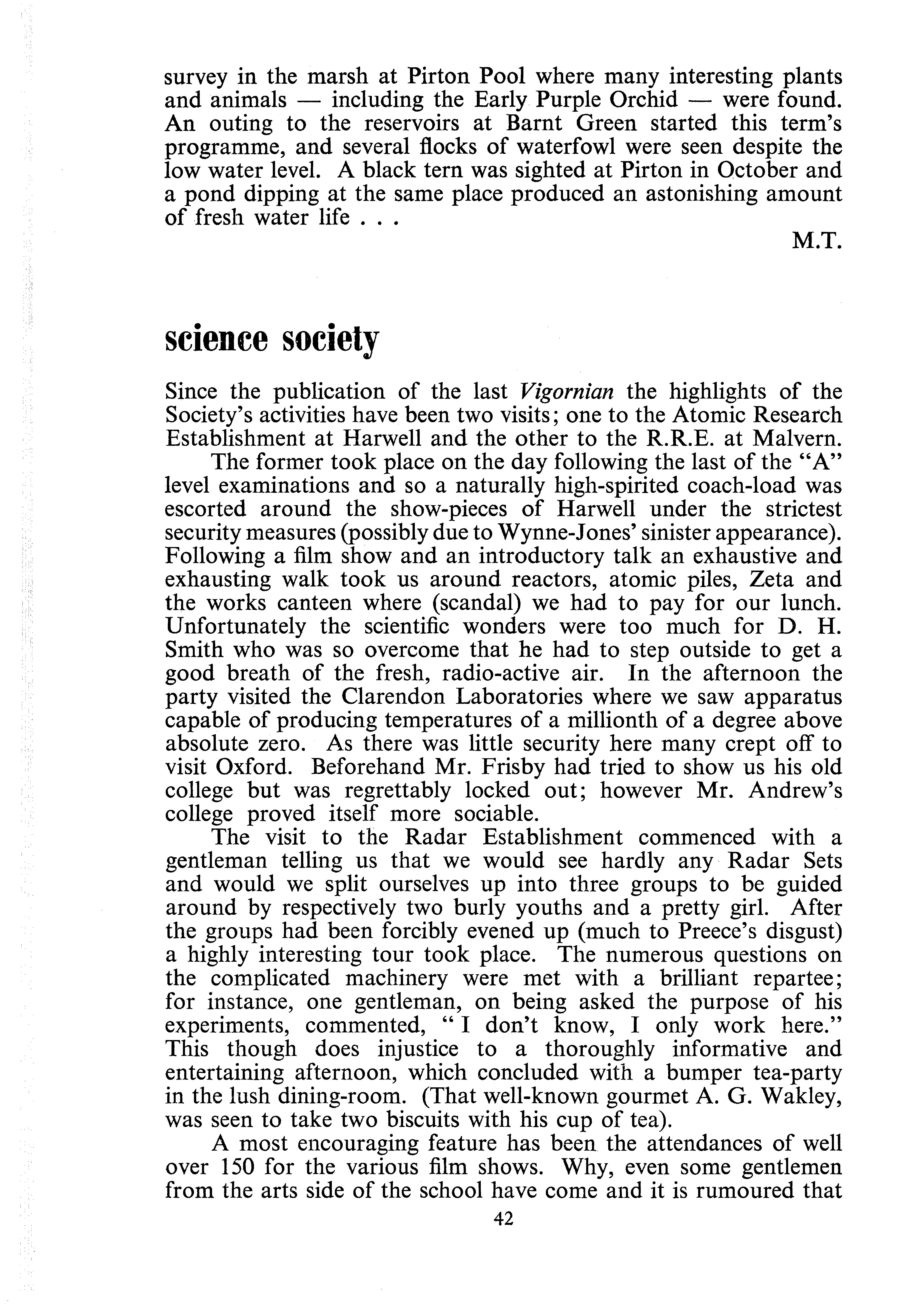
survey in the marsh at Pirton Pool where many interesting plants and animals - including the Early Purple Orchid -' were found. An outing to the reservoirs at Barnt Green started this term's programme, and several flocks of waterfowl were seen despite the low water level. A black tern was sighted at Pirton in October and a pond dipping at the same place produced an astonishing amount of ·fresll water life
Since the publication of the last Vigornian the highlights of the Society's activities have been two visits; one to the Atomic Research Establishment at Harwell and the other to the R.R.E. at Malvern.
The former took place on the day following the last of the "A" level examinations and so a naturally higll-spirited coach-load was escorted around the show-pieces of Harwell under the strictest security measures (possibly due to Wynne-J ones' sinister appearance). Following a film show and an introductory talk an exhaustive and exhausting walk took us around reactors, atomic piles, Zeta and the works canteen where (scandal) we had to pay for our lunch. Unfortunately the scientific wonders were too much for D. H. Smith who was so overcome that he had to step outside to get a good breath of the fresh, radio-active air. In the afternoon the party visited the Clarendon Laboratories where we saw apparatus capable of producing temperatures of a milliontll of a degree above absolute zero. As there was little security here many crept off to visit Oxford. Beforehand Mr. Frisby had tried to show us his old college but was regrettably locked out; however Mr. Andrew's college proved itself lTIore sociable.
The visit to the Radar Establishment commenced with a gentleman telling us that we would see hardly any· Radar Sets and would we split ourselves up into three groups to be guided around by respectively two burly youths and a pretty girl. After the groups had been forcibly evened up (much to Preece's disgust) a highly interestil1g tour took place. The numerous questions on the complicated machinery were met with a brilliant repartee; for instance, one gentleman, on being asked the purpose of his experiments, commented, "I don't know, I only work here." This though does injustice to a thoroughly informative and entertaining afternoon, which concluded with a bumper tea-party in the lush dining-room. (That well-known gourmet A. G. Wakley, was seen to take two biscuits with his cup of tea).
A most el1couraging feature has been. the attendances of well over 150 for the various film shows. Why, even some gentlemen from the arts side of the school have come al1d it is rumoured that 42
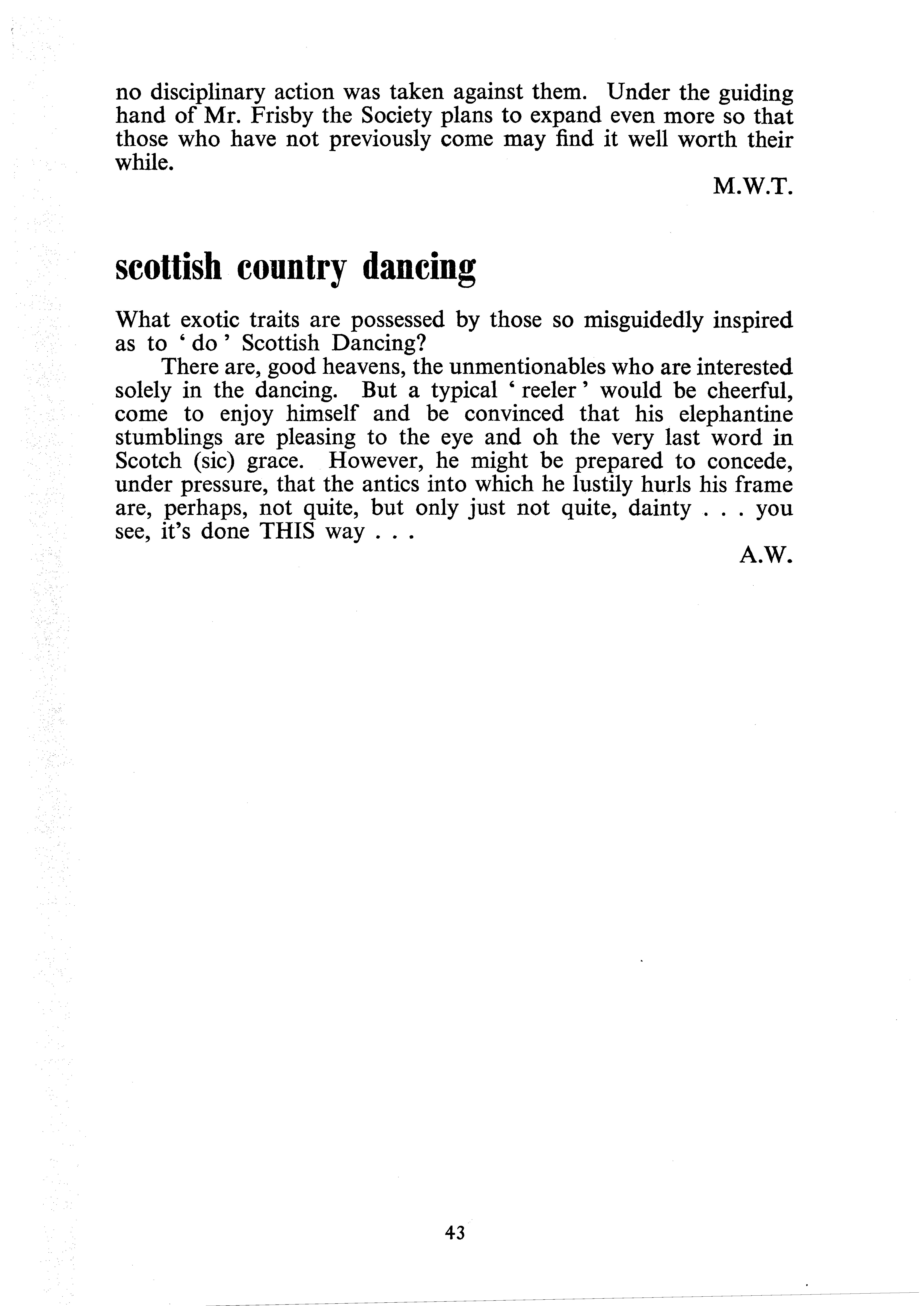
no disciplinary action was taken against them. Under the guiding hand of Mr. Frisby the Society plans to expand even more so that those who have not previously come may find it well worth their while.
M.W.T.
What exotic traits are possessed by those so misguidedly inspired as to 'do' Scottish Dancing?
There are, good heavens, the unmentionables who are interested solely in the dancing. But a typical 'reeler' would be cheerful, come to enjoy himself and be convinced that his. elephantine stumblings are pleasing to the eye and oh the very last word in Scotch (sic) grace. However, he might be prepared to concede, under pressure, that the antics into which he lustily hurls his frame are, perhaps, not quite, but only just not quite, dainty. . . you see, it's done THIS way . . .


aedilibus

The fine summer enabled much cricket to be played under conditions seldom enjoyed during recent seasons. Often, however, the hot sun removed much of the gloss of participating. Practice in the nets became an arduous chore for which it was difficult to maintain enthusiasm.
The record of the eleven in terms of matches won is not impressive but the batsmen realised some fine totals on the hard fast wickets predominating',..the season. Both Senter and Haynes played some good opening innings but rarely hit form together. Of the middle batsmen Woolley was consistently strong and Austen and Lyon had several good knocks. Watkins rose to the occasion in one or two tight corners.
Many runs and games were regrettably lost this season through incompetent fielding. This failingwa.s due to the assumption that 1st XI players would be capable fielders and hence fielding practice was sadly neglected. The wickets gave little help to the bowlers but both Woolley, fast-medium, and Garret, slow left-arm, achieved good analyses.

Result For Against
v. Dean Close (H) Tie 183-7 dec. 183 (Lyon 56, (Watkins 4-54) Austen 47)
v. Bromsgrove (A) Lost 96 98 (Woolley 24, (Brown 5-23) Watkins 21)
v. Hereford C.S. (A) Won 80-5 77 (Wo.olley28)
v. Magdalen ColI. (A) Lost 66 282-9 dec. School (Senter 29) (Garrett 6-75)'
v. King Edward's, (H) Drawn 175-9 dec. 95-7 Birmingham (Smith 42, (Woolley 6-37) Austen 34, Haynes 27)
v. Warwick School (H) Drawn 145-4 200-7 dec. (Woolley 62)
v. Malvern College (A) Drawn 157-4 219 "A" XI (Senter 77, (Garrett 9-74) Smith 44)
v. Wores. Club & (H) Lost 123 124-1 Ground (Brown 28)
v. Old Vigornians (H) Lost 118 175 (Woolley 30) (Woolley 6-55)

match reports
v. Dean Close.
The result of the first match reflects the pattern which arose too often during the season, that of a good total being wasted by poor fielding. The school opened on an easy paced wicket but until
the score reached 100 the wickets fell fairly regularly. Then Lyon
and Austen came together and with some very entertaining cricket
pushed the score along to 183. The visitors opened unsteadily but their middle batsmen batted soundly and due to their good" tail enders" approached uncomfortably close to . our total. Five minutes before stumps were drawn their last man was out l.b.w., with the scores level.
On a very hot day at Malvern the school fielded whilst the College amassed 219 runs. Garrett bowled solidly and took 9-74. The school replied strongly being 157-4 at the close. The innings included an undefeated 77 by Senter. But for this third match in succession insufficient time foiled the team.
The day of the O.V. match began oddly like a November one. H did not stop raining until noon but, fortunately, the ground permitted ha1f-an-hour's play before lunch in which the O.V.'s put on 35 for the loss of a single wicket and also Godsall who retired hurt with a damaged finger. After lunch it looked likely that the O.V.'s would not reach the century for Woolley was bowling with real sting. But a stalwart stand between Haze1dine (46) and Godsall (56), who returned at number 11, raised the score to 175. The school innings lacked vitality except for a strong 30 by Woolley. The innings closed at 118, Haze1dine having had a hand in 8 of the wickets, actually taking 5 of them.
The following were re-awarded colours for the season 1959:Woolley, T. R. Senter, A. M. Brown, M. R. Dud1ey. The following were awarded colours for the season 1959:J. Watkins. W. P. Garrett. J. M. Austin. R. F. Haynes. J. M. Lyon. D. G. Robinson. M. Woolley was awarded both the batting and the bowling cups.
The house matches this year were won by Castle House, who narrowly defeated Chappe1 House in a very exciting final. 48
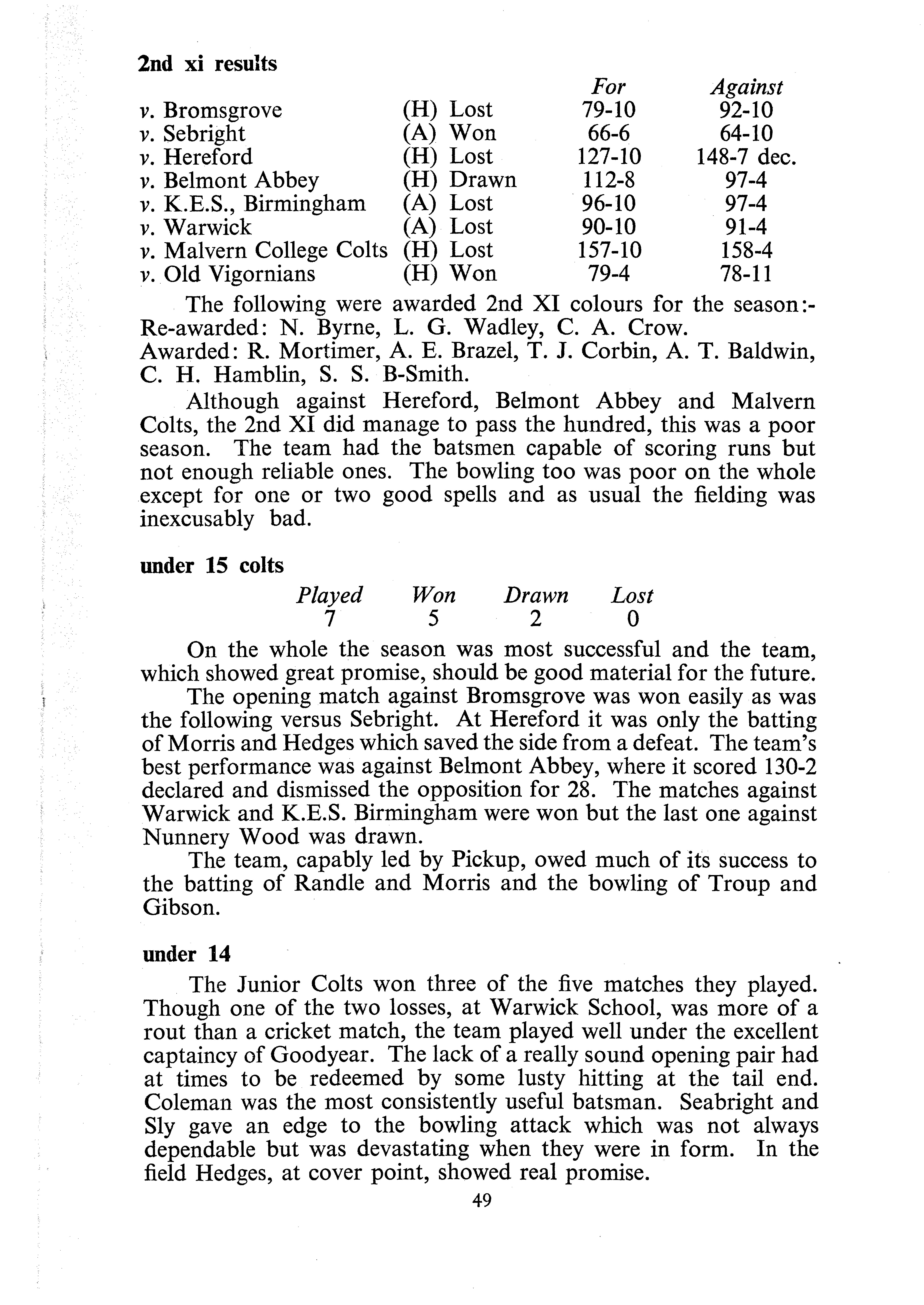
2nd xi results
v. Bromsgrove (H) Lost 79-10 92-10
v. Sebright (A) Won 66-6 64-10
v. Hereford (H) Lost 127-10 148-7 dec.
v. Belmont Abbey (H) Drawn 112-8 97-4
v. K.E.S., Birmingham (A) Lost . 96-10 97-4
v. Warwick (A) Lost 90-10 . 91-4
v. Malvern College Colts (H) Lost 157-10 158-4
y. .Old Vigornians (H) Won 79-4 78-11
The following were awarded 2nd XI colours for the season:Re-awarded: N. Byrne, L. G. Wadley, C. A. Crow. Awarded: R. Mortimer, A. E. Brazel, T. J. Corbin, A. T. Baldwin, C. H. Hamblin, S. S. B-Smith.
Although against Hereford, Belmont Abbey and Malvern Colts, the 2nd XI did manage to pass the hundred, this was a poor season. The team had the batsmen capable of scoring runs but not enough reliable ones. The bowling too "vas poor on the whole except for one or two good spells and as usual the fielding was inexcusably bad.
under 15 colts
Played Won Drawn Lost 7 520
On the whole the season was most successful and the team, which showed great promise, should be good material for the future.
The opening match against Bromsgrove was won easily as was the following versus Sebright. At Hereford it was only the batting of Morris and Hedges which saved the side from a defeat. The team's best performance was against Belmont Abbey, where it scored 130-2 declared and dismissed the opposition for 28. The matches against Warwick and K.E.S. Birmingham were won but the last one against Nunnery Wood was drawn.
The team, capably led by Pickup, owed much of its success to the batting of Randle and Morris and the bowling of Troup and Gibson.
under 14
The Junior Colts won three of the five matches they played. Though one of the two losses, at Warwick School, was more of a rout than a cricket match, the team played well under the excellent captaincy of Goodyear. The lack of a really sound opening pair had at times to be redeemed by some lusty 11itting at the tail end. Coleman was the most consistently useful batsman. Seabright and Sly gave an edge to the bowling attack which was not always dependable but was devastating when they were in form. In the field Hedges, at cover point, showed real promise.
49
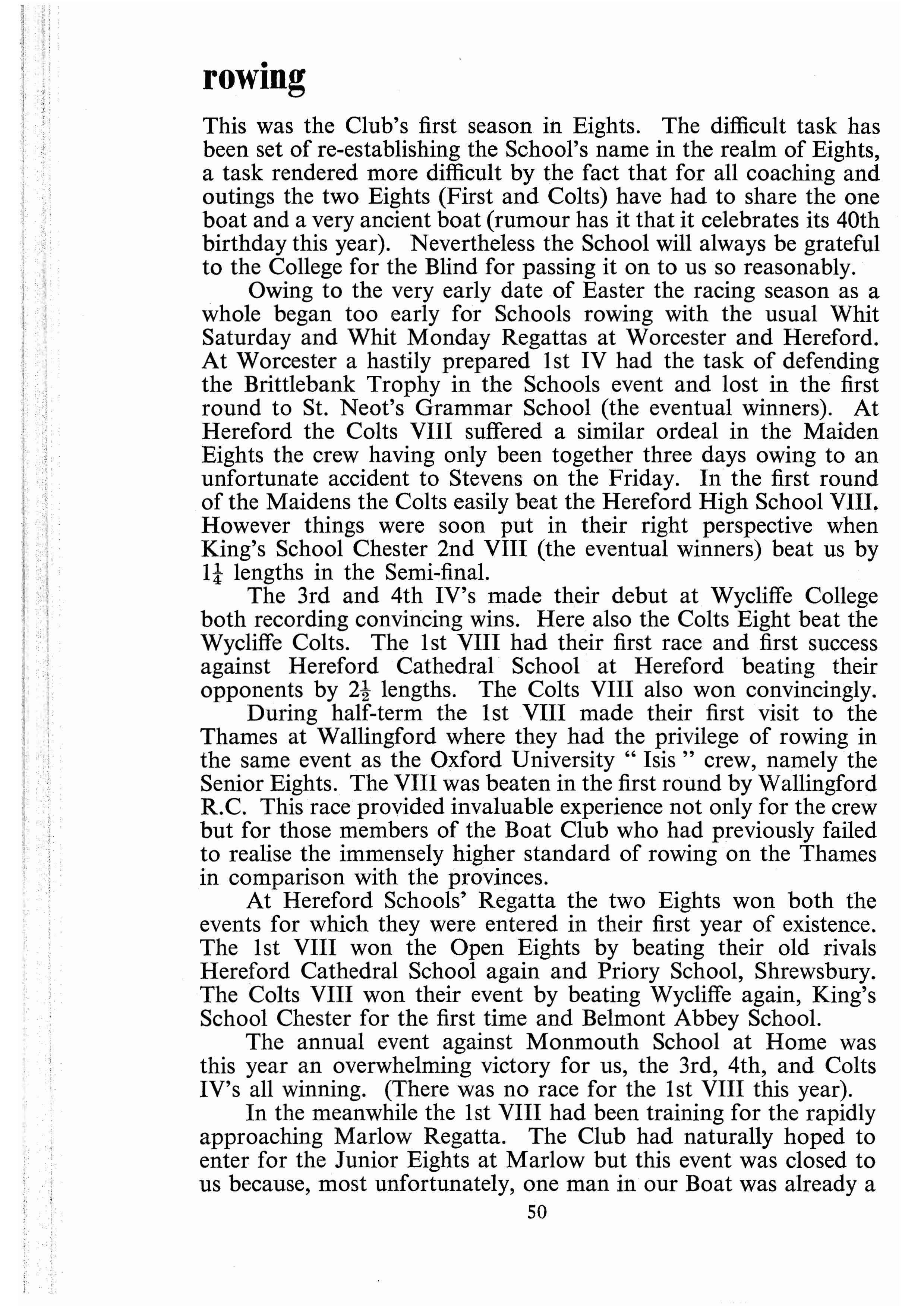
This was the Club's first season in Eights. The difficult task has been set of re-establishing the School's name in the realm of Eights, a task rendered more difficult by the fact that for all coaching and outings the two Eights (First and Colts) have had to share the one boat and a very ancient boat (rumour has it that it celebrates its 40th birthday this year). Nevertheless the School will always be grateful to the College for the Blind for passing it on to us so reasonably.
Owing to the very early date of Easter the racing season as a whole began too early for Schools rowing with the usual Whit Saturday and Whit Monday Regattas at Worcester and Hereford. At Worcester a hastily prepared 1st IV had the task of defending the Brittlebank Trophy in the Schools event and lost in the first round to St. Neot's Grammar School (the eventual winners). At Hereford the Colts VIII suffered a similar ordeal in the Maiden Eights the crew having only been together three days owing to an unfortunate accident to Stevens on the Friday. In the first round of the Maidens the Colts easily beat the Hereford High School VIIt However things were soon put in their right perspective when King's School Chester 2nd VIII (the eventual winners) beat us by 1t lengths in the Semi-final.
The 3rd and 4th IV's made their debut at Wycliffe College both recording convincing wins. Here also the Colts Eight beat the Wycliffe Colts. The 1st VIII had their first race and first success
against Hereford Cathedral School at Hereford beating their opponents by 2t lengths. The Colts VIII also won convincingly. During half-term the 1st VIII made their first visit to the Thames at Wallingford where they had the privilege of rowing in the same event as the Oxford University" Isis " crew, namely the Senior Eights. The VIII was beaten in the first round by Wallingford R.C. This race provided invaluable experience not only for the crew but for those members of the Boat Club who had previously failed to realise the immensely higher standard of rowing on the Thames in comparison with the provinces.
At Hereford Schools' Regatta the two Eights won both the events for which they were entered in their first year of existence. The 1st VIII won the Open Eights by beating their old rivals Hereford Cathedral School again and Priory School, Shrewsbury. The Colts VIII won their event by beating Wycliffe again, King's School Chester for the first time and Belmont Abbey School. The annual event against Monmouth School at Home was this year an overwhelming victory for us, the 3rd, 4th, and Colts IV's all winning. (There was no race for the 1st VIII this year).
In the meanwhile the 1st VIII had been training for the rapidly approaching Marlow Regatta. The Club had naturally hoped to enter for the Junior Eights at Marlow but this event was closed to us because, most unfortunately, one man in our Boat was already a so
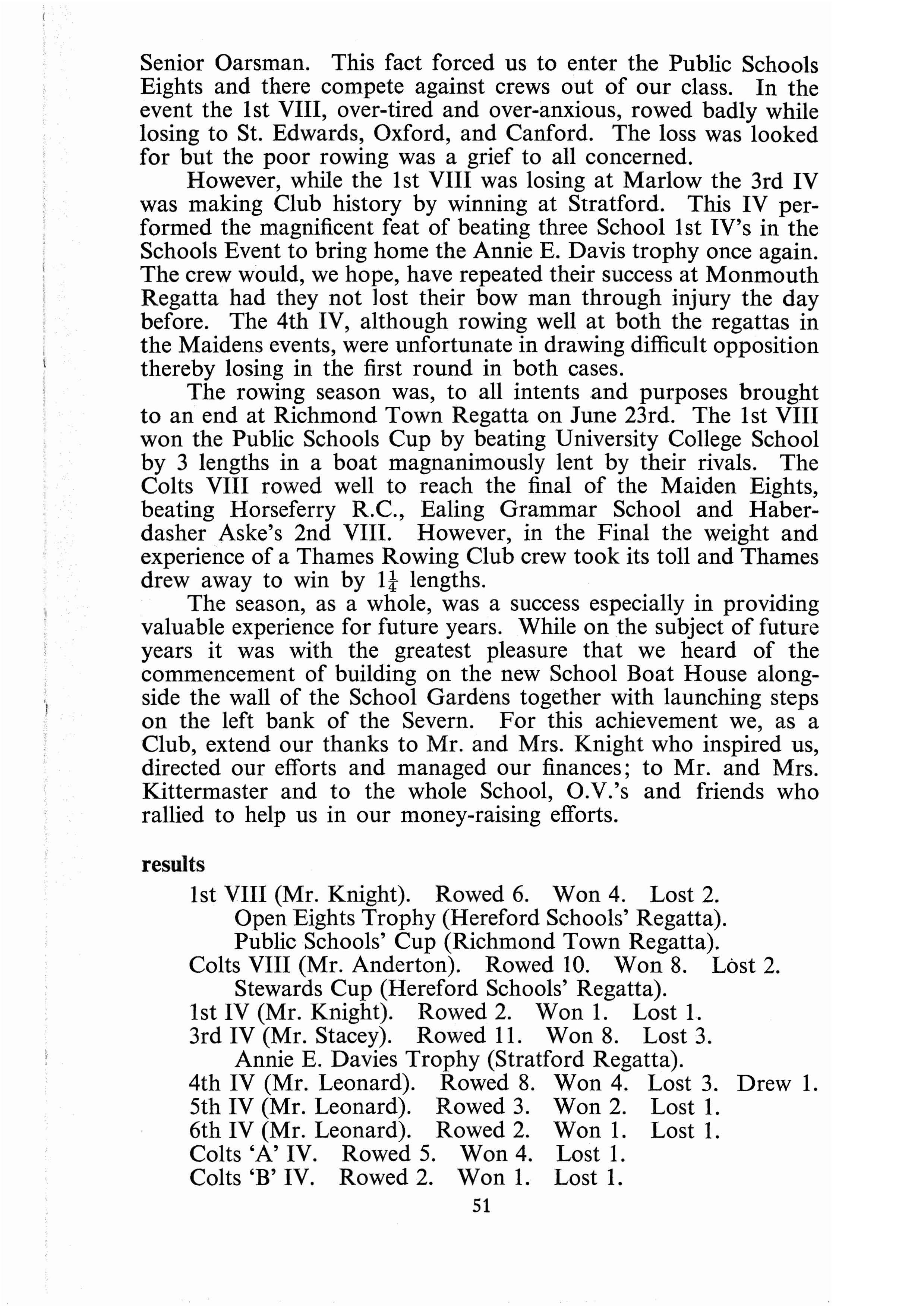
Senior Oarsman. This fact forced us to enter the Public Schools Eights and there compete against crews out of our class. In the event the 1st VIII, over-tired and over-anxious, rowed badly while losing to St. Edwards, Oxford, and Canford. The loss was looked for but the poor rowing was a grief to all concerned.
However, while the 1st VIII was losing at Marlow the 3rd IV was making Club history by winning at Stratford. This IV performed the magnificent feat of beating three School 1st IV's in the Schools Event to bring home the Annie E. Davis trophy once again. The crew would, we hope, have repeated their success at Monmouth Regatta had they not lost their bow man through injury the day before. The 4th IV, although rowing well at both the regattas in the Maidens events, were unfortunate in drawing difficult opposition thereby losing in the first round in both cases.
The rowing season was, to all intents and purposes brought to an end at Richmond Town Regatta on June 23rd. The 1st VIII won the Public Schools Cup by beating University College School by 3 lengths in a boat magnanimously lent by their rivals. The Colts VIII rowed well to reach the final of the Maiden Eights, beating Horseferry R.C., Ealing Grammar School and Haberdasher Aske's 2nd VIII. However, in the Final the weight and experience of a Thames Rowing Club crew took its toll and Thames drew away to win by 11 lengths.
The season, as a whole, was a success especially in providing valuable experience for future years. While on the subject of future years it was with the greatest pleasure that we heard of the commencement of building on the new School Boat House along
side the wall of the School Gardens together with launching steps
on the left bank of the Severn. For this achievement we, as a Club, extend our thanks to Mr. and Mrs. Knight who inspired us, directed our efforts and managed our finances; to Mr. and Mrs. Kittermaster and to the whole School, O.V.'s and friends who rallied to help us in our money-raising efforts.
results
1st VIII (Mr. Knight). Rowed 6. Won 4. Lost 2. Open Eights Trophy (Hereford Schools' Regatta). Public Schools' Cup (Richmond Town Regatta).
Colts VIII (Mr. Anderton). Rowed 10. Won 8. Lost 2. Stewards Cup (Hereford Schools' Regatta).
1st IV (Mr. Knight). Rowed 2. Won 1. Lost 1.
3rd IV (Mr. Stacey). Rowed 11. Won 8. Lost 3. Annie E. Davies Trophy (Stratford Regatta).
4th IV (Mr. Leonard). Rowed 8. Won 4. Lost 3. Drew 1.
5th IV (Mr. Leonard). Rowed 3. Won 2. Lost 1.
6th IV (Mr. Leonard). Rowed 2. Won 1. Lost 1.
Colts 'A' IV. Rowed 5. Won 4. Lost 1.
Colts 'B' IV. Rowed 2. Won 1. Lost 1.
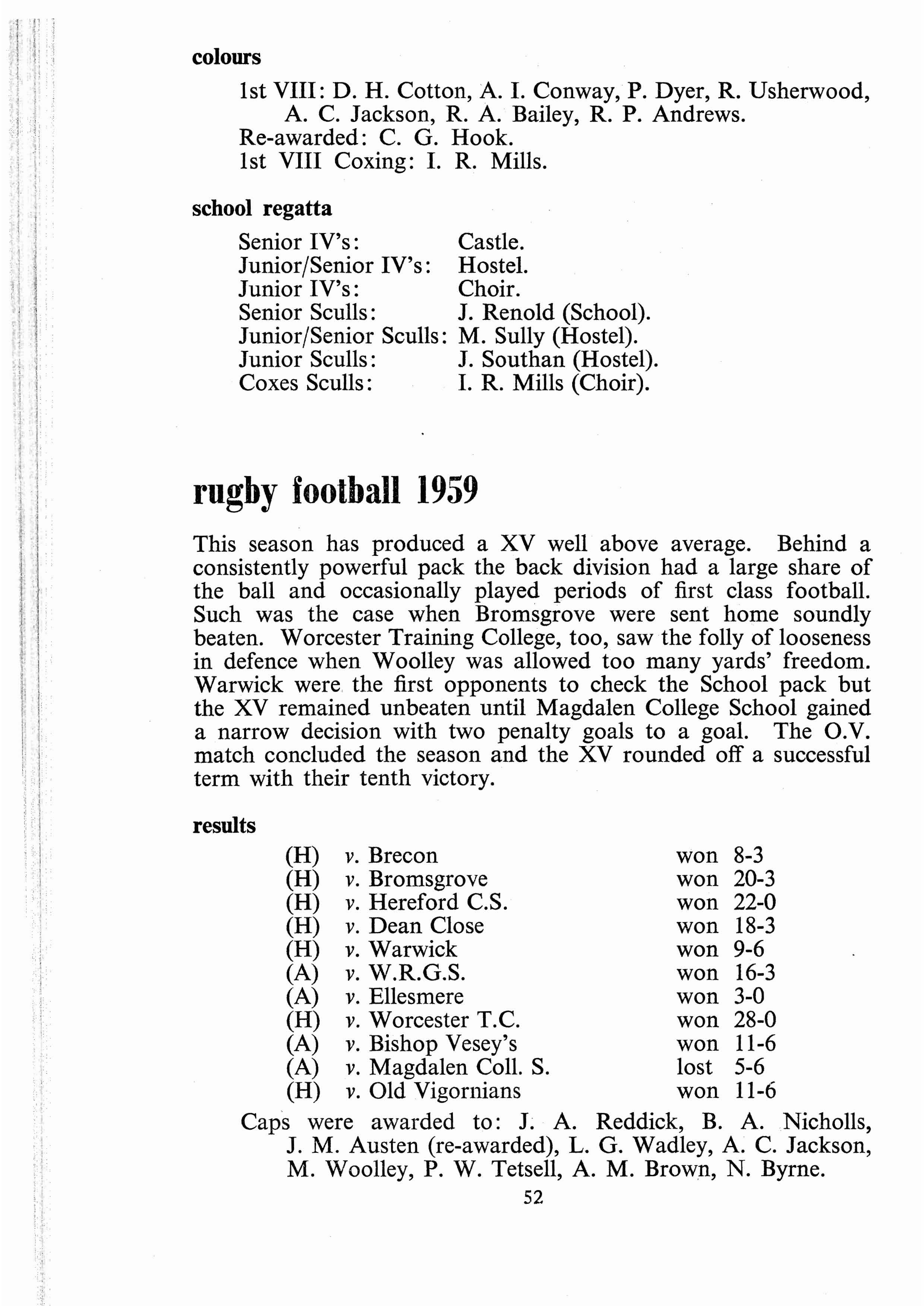
1st VIII: D. H. Cotton, A. I. Conway, P. Dyer, R. Usherwood,
A. C. Jackson, R. A. Bailey, R. P. Andrews.
Re-awarded: C. G. Hook.
1st VIII Coxing: I. R. Mills.
school regatta
Senior IV's: Castle.
Junior/Senior IV's: Hostel.
Junior IV's: Choir.
Senior Sculls: J. Renold (School).
Junior/Senior Sculls: M. Sully (Hostel).
Junior Sculls: J. Southan (Hostel) .
Coxes Sculls: I. R. Mills (Choir).
This season has produced a XV well above average. Behind a
consistently powerful pack the back division had a large share of
the ball and occasionally played periods of first class football. Such was the case when Bromsgrove were sent home soundly
beaten. Worcester Training College, too, saw the folly of looseness
I in defence when W oolley was allowed too many yards' freedom. Warwick were. the first opponents to check the School pack but
the XV remained unbeaten until Magdalen College School gained
a narrow decision with two penalty goals to a goal. The O.V. match concluded the season and the XV rounded off a successful
term with their tenth victory.
results (H) v. Brecon won 8-3 (H) v. Bromsgrove won 20-3 (H) v. Hereford C.S. won 22-0 , (H) v. Dean Close won 18-3
, (H) v. Warwick won 9-6
(A) v. W.R.G.S. won 16-3 i (A) v. Ellesmere won 3-0
(H) v. Worcester T.C. won 28-0 (A) v. Bishop Vesey's won 11-6 (A) v. Magdalen ColI. S. lost 5-6 (H) v. Old Vigornians won 11-6
Caps were awarded to: A. Reddick, B. A.Nicholls, J. M. Austen (re-awarded), L. G. Wadley, A. C. Jackson, M. Woolley, P. W. Tetsell, A. M. Brown, N. Byrne.
Colours: J. A. Reddick, B. A. Nicholls, J. M. Austen, L. G. Wadley, A. C. Jackson, ,M. Woolley (all re-awarded), N. Byrne, A. M. Brown, M. C. Andrews, P. W. Tetsell, R. J. White, R. A. Hall, C. H. Eames, T. ,M.Wadsworth, P. I. McLauchlan.
match reports
v. Bromsgrove. won 20-3.
This was the first victory gained against Bromsgrove and with the ball running for the School it became a convindng one. The pack held their heavier opponents and the hooking was first class. The three-quarters, too, struck excellent form and made the most of every opportunity that came their way. The School played in the first half with the aid of a strong wind and scored tries, through Jackson, Wadleyand Woolley. The XV defended very sharply in the second half and actually increased their lead through J ackson who thus ended an exciting display at stand-off half. Woolley converted all four tries.
v. W.R.G.S. won 16-3.
The School played much better than it usually does against its greatest rival. Although slightly outhooked in the first half, the XV held the upper hand and scored tries through W oolley and Wadley, the former converting the latter's try. The School raised its game in the second half and tries, the results of smart breakthroughs by the three-quarters, were scored by White and Woolley, W oolley again converting one of the tries. Incessant use of the kick ahead, although it sometimes paid dividends, spoiled many of the side's scoring chances.
2nd xv
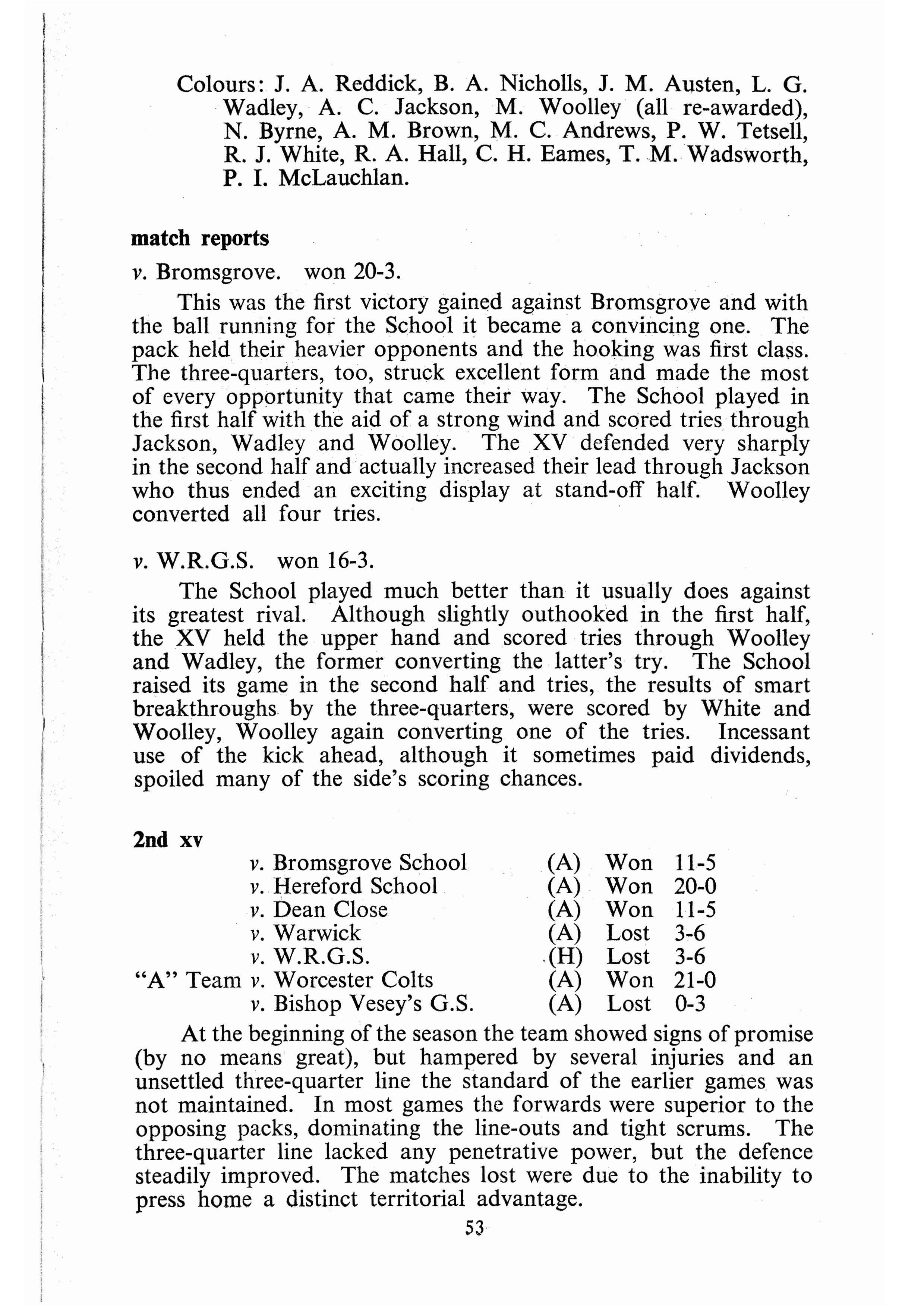
v. Bromsgrove School (A) Won 11-5
v. Hereford School (A) Won 20-0
v. Dean Close (A) Won 11-5
v. Warwick (A) Lost 3-6
v. W.R.G.S. .(H) Lost 3-6 "A" Teanl v. Worcester Colts (A) Won 21-0 v. Bishop Vesey's G.S. (A) Lost 0-3
At the beginning of the season the team showed signs of promise (by no means great), but hampered by several injuries and an unsettled three-quarter line the standard of the earlier games was not maintained. In most games the forwards were superior to the opposing packs, dominating the line-outs and tight scrums. The three-quarter line lacked any penetrative power, but the defence steadily improved. The matches lost were due to the inability to press home a distinct territorial advantage. 53
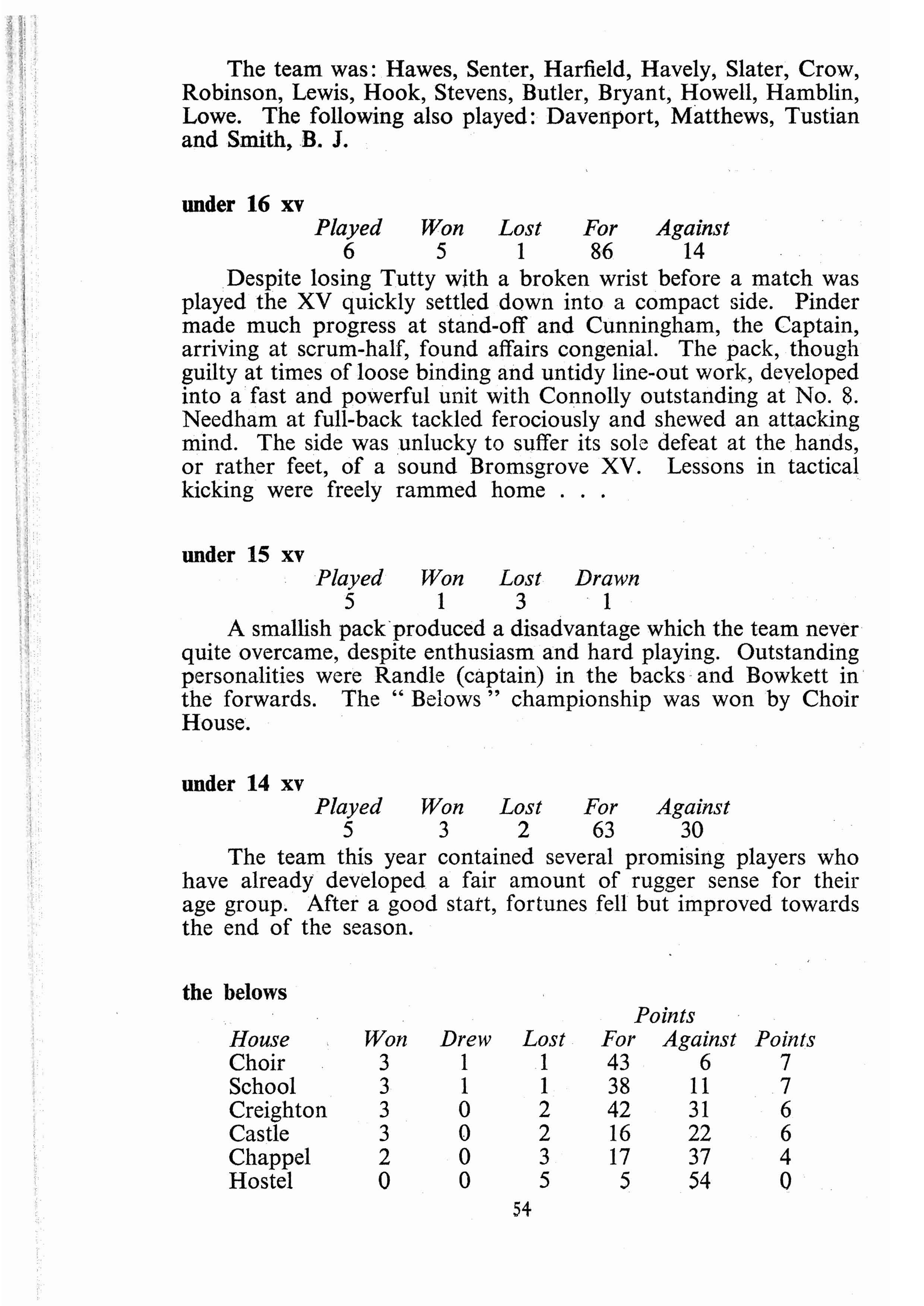
The team was: Hawes, Senter, Harfield, Havely; Slater, Crow, Robinson, Lewis, Hook, Stevens, Butler, Bryant, Howell, Hamblin, Lowe. The following also played: Davenport, Matthews, Tustian and Smith,B. J.
under 16 xv
Played Won Lost For Against 6 51 8-6 14
Despite losing Tutty with a broken wrist before a match was played the XV quickly settleddQwn into a compact side. Pinder made much progress at stand-off and Cunningham, the Captain, arriving at scrum-half, found affairs congenial. The pack, though guilty at times of loose binding and untidy line-out work, developed into a fast and powerful unit with Connolly outstanding at No. 8. Needham at full-back tackled ferociously and shewed an attacking mind. The side was unlucky to suffer its sole defeat at the. hands, or rather feet, of a sound BromsgroveXV. Lessons in tactical kicking were freely rammed home . . .
under 15 xv
Played Won Lost Drawn 5 131
A smallish pack produced a disadvantage which the team never quite overcame, despite enthusiasm and hard playing. Outstanding personalities were Randle (captain) in the backs -and Bowkett in' the forwards. The" Belows " championship was won by Choir House.
under 14 xv
Played Won Lost For Against 5 32 63 30
The team this year contained several promising players who have already developed a fair amount of rugger sense for their age group; After a good statt, fortunes fell but improved towards the end of the season.
the senior seven-a-sides
Creighton (bye)
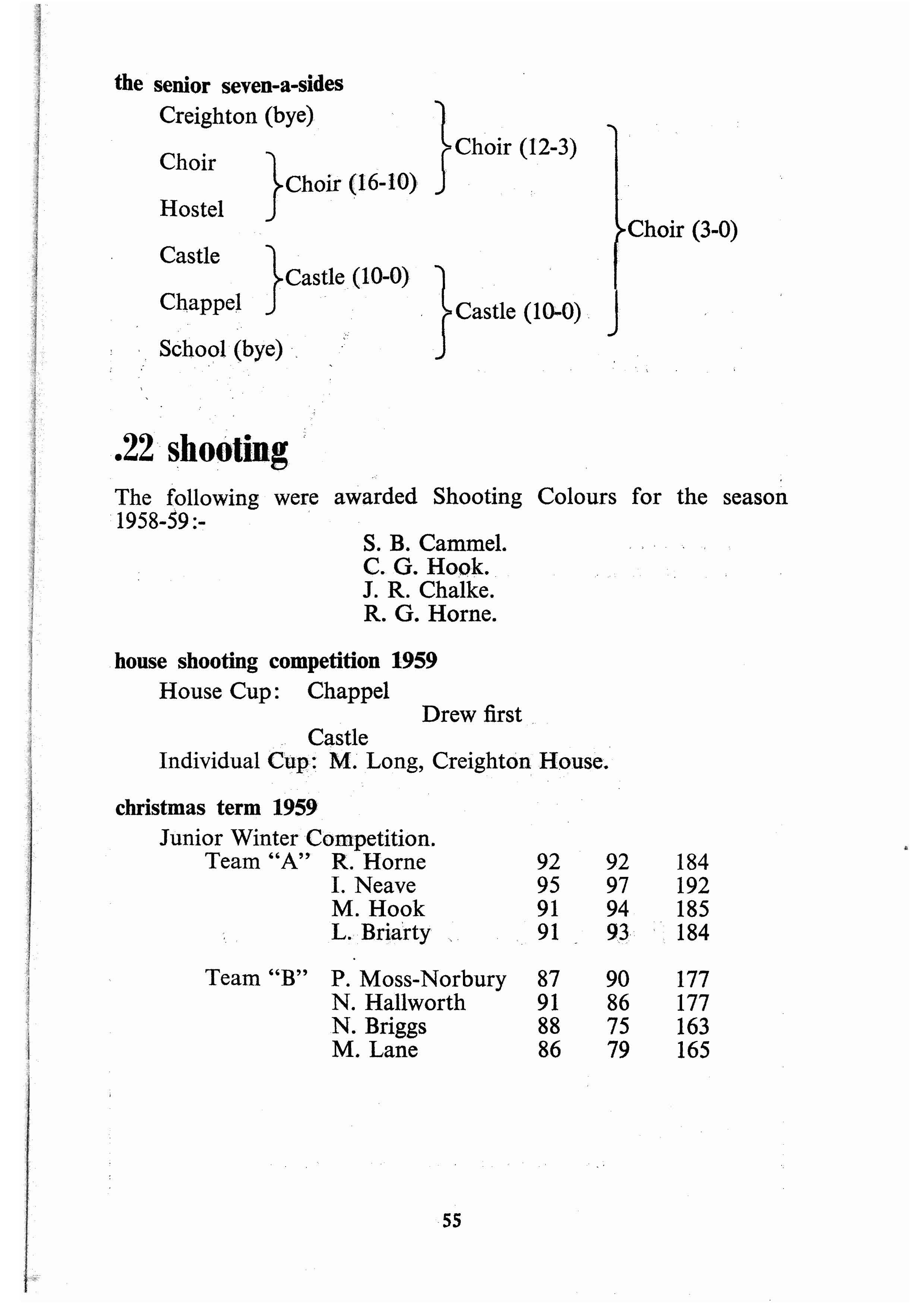
(12-3)
(16-10)
Castle } . .Castle (10-0)
Chappel (bye) ..
The following were 1958-59 :
Choir (3-0)
(1()'()
awarded Shooting Colours for the season
S. B. Cammel. C. G. Hook. J. R. Chalke. R. G. Horne.
house shooting competition 1959
House Cup: Chappel
Drew first .. Castle
Individual Cup: M. Long, CreightonHouse.
christmas term 1959
Junior Winter Competition.
Team "A" R. Horne
I. Neave
M. Hook
L.
Team "B" P. Moss-Norbury
N. Hallworth
N. Briggs
M. Lane


